QNAP vs UniFi NAS: Home and Business NAS Comparison
UPDATE – The UniFi UNAS Pro NAS is now available and can be found HERE
In the realm of Network Attached Storage (NAS), QNAP has long been a dominant player, known for its extensive range of high-performance NAS solutions and rich software ecosystem. On the other hand, UniFi, a well-known brand for networking solutions under Ubiquiti, is a newcomer in the NAS space. With the recent launch of the UniFi UNAS Pro, UniFi is entering the highly competitive NAS market that has been dominated by companies like QNAP for decades. This article takes a close look at the NAS solutions offered by QNAP and UniFi, comparing their hardware, software, security, expandability, and overall value. The aim is to help users decide which NAS system best fits their needs—whether for home use, small business, or enterprise-level data management.
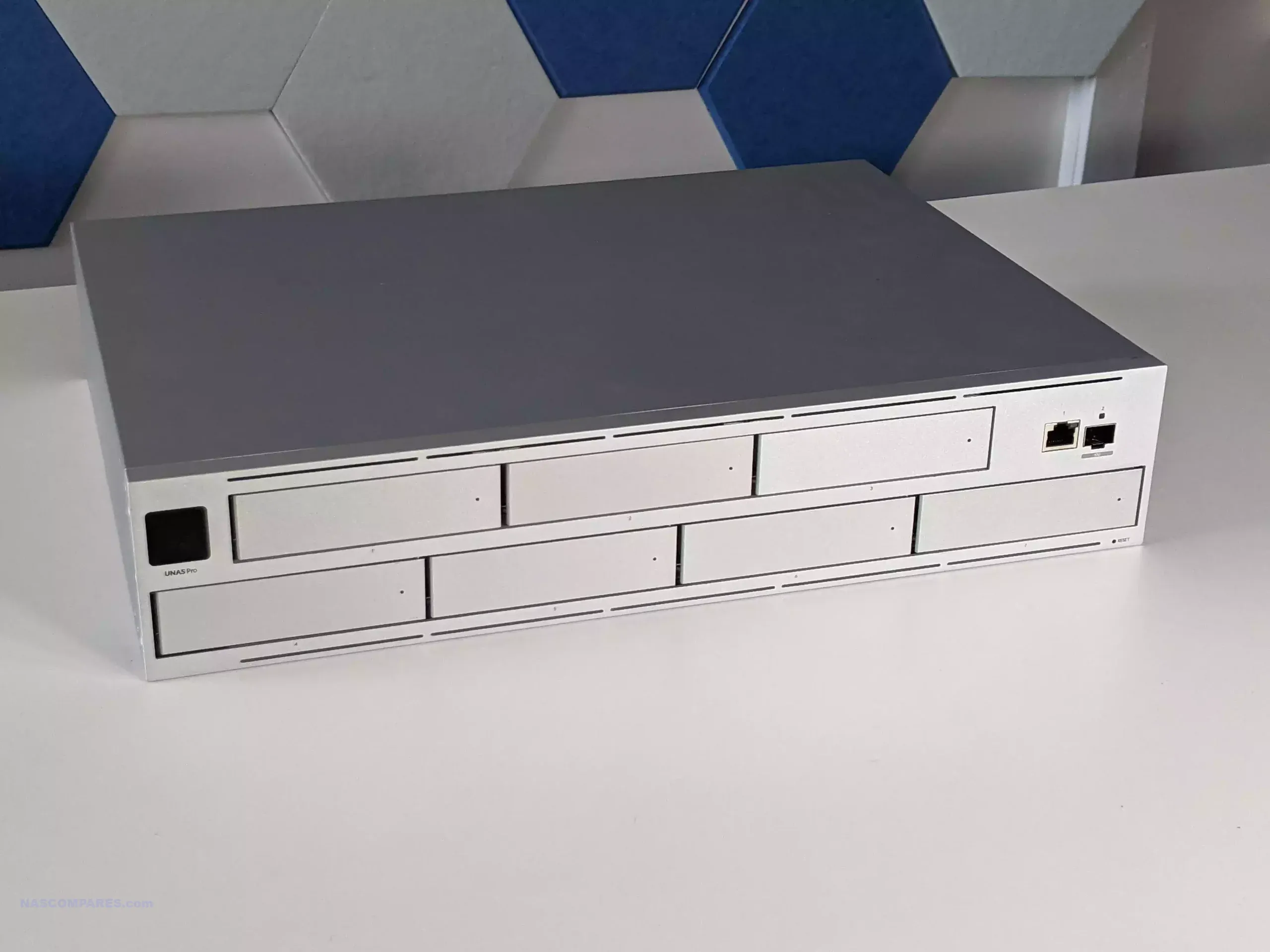
QNAP vs UniFi NAS – Price
When it comes to price, UniFi enters the market with aggressive pricing for its UNAS Pro NAS, while QNAP offers a wide range of models at various price points. The UniFi UNAS Pro is priced at $499, making it a competitive 7-bay rackmount NAS with built-in 10GbE networking. This is a very appealing price point, especially for small businesses or home offices looking to add a NAS to their network. It’s designed to provide a simple, integrated solution for users already invested in the UniFi ecosystem.
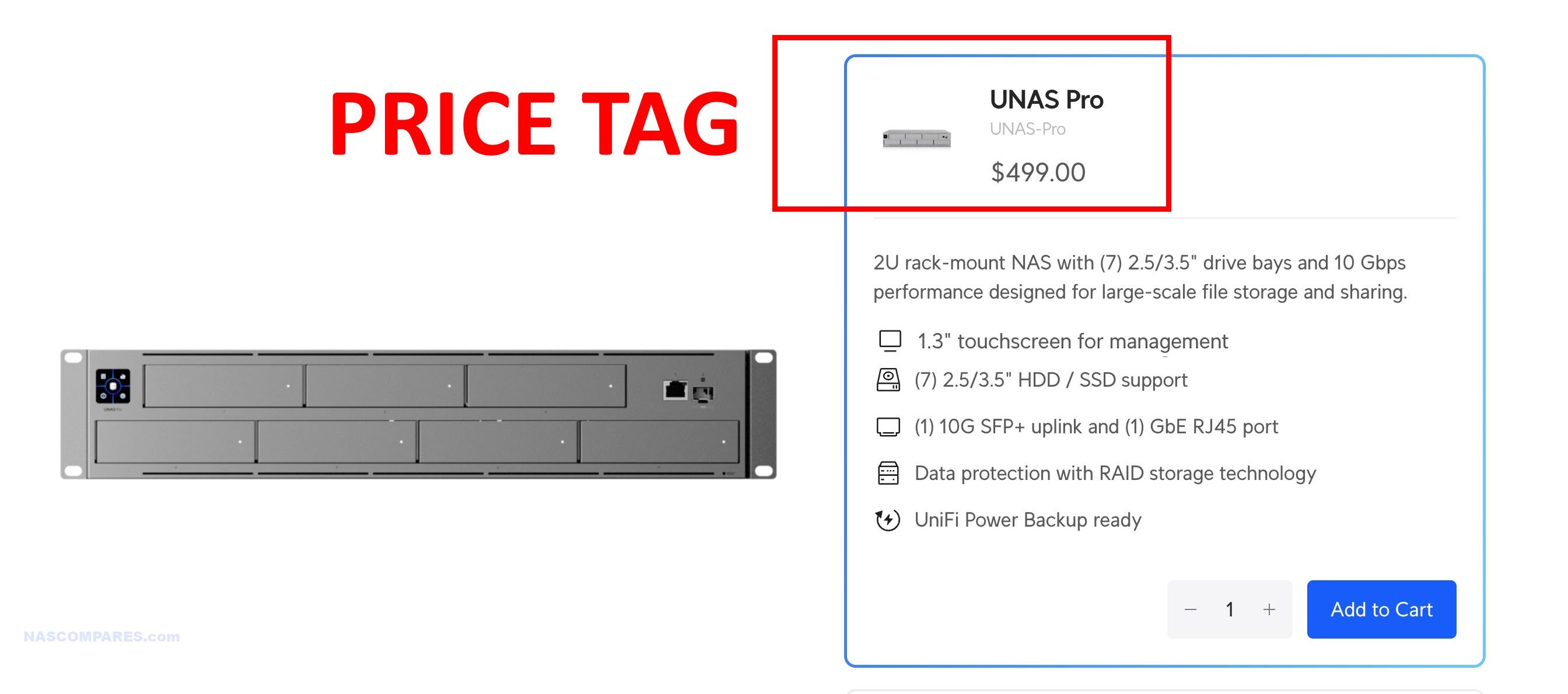
QNAP, on the other hand, has a vast portfolio of NAS solutions, ranging from entry-level home models to enterprise-grade systems. The QNAP TS-464, which is similarly priced at around $499, offers a 4-bay desktop NAS with a more powerful Intel Celeron quad-core processor and dual 2.5GbE ports. This model supports PCIe upgrades for additional 10GbE connectivity, providing flexibility in network performance as user needs grow.
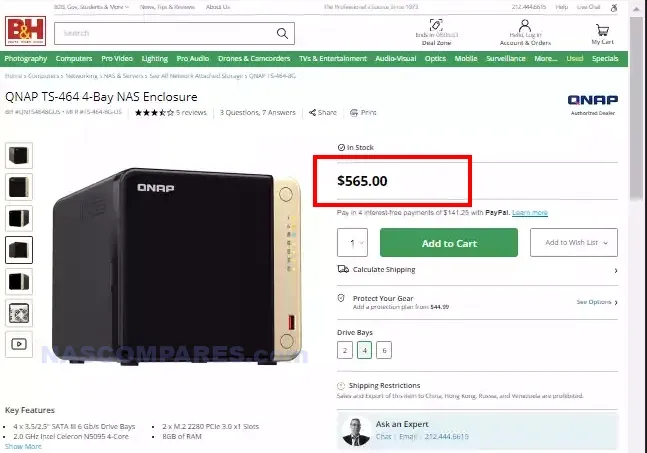
QNAP’s rackmount models, such as the TS-832PXU, are more expensive, starting around $800, offering an ARM-based 8-bay NAS with dual 10GbE ports and more enterprise features.
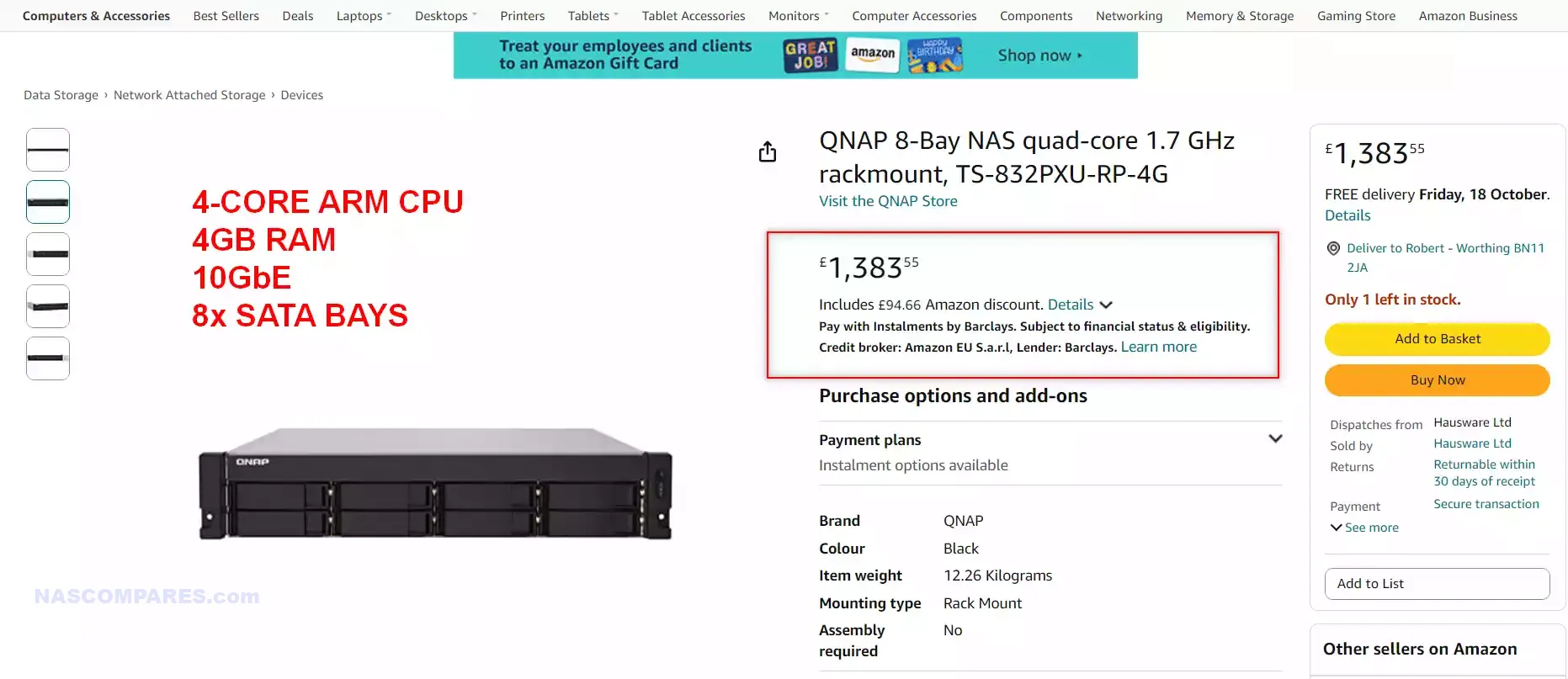
While QNAP’s range offers more flexibility and higher-end options, UniFi’s UNAS Pro delivers a great entry-level NAS with robust networking features at a lower price point. For users who need a simple NAS solution integrated into their existing UniFi network, the UNAS Pro presents a very competitive option.
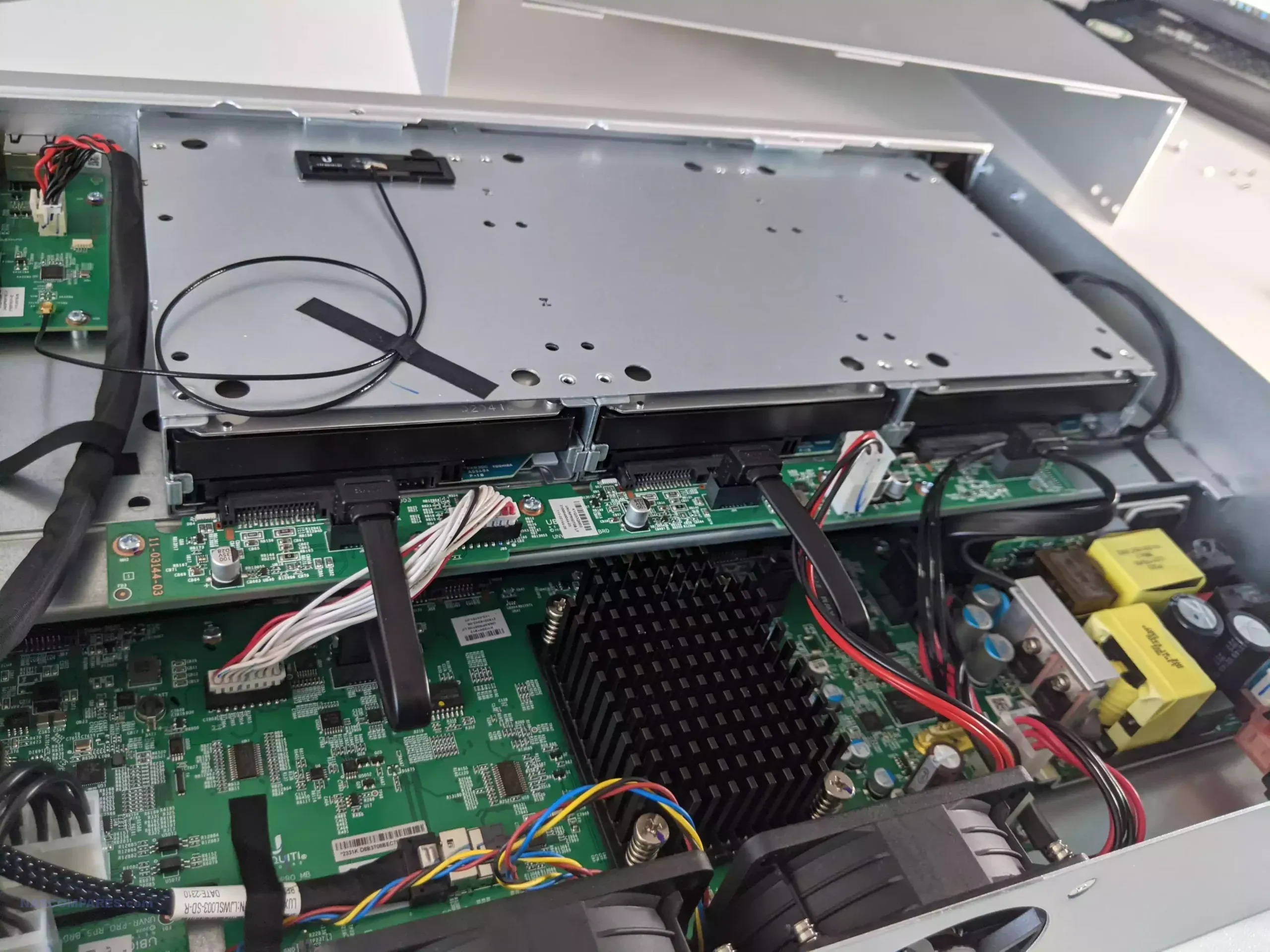
QNAP vs UniFi NAS – Hardware / Range / Value for Money
QNAP has established itself as a leader in NAS hardware, offering a wide variety of devices that cater to home users, SMBs, and enterprise environments. Their hardware is known for its flexibility and upgradeability, with options for PCIe expansion, SSD caching, and higher-performance processors. UniFi’s UNAS Pro, however, is positioned as an affordable, 7-bay rackmount NAS.
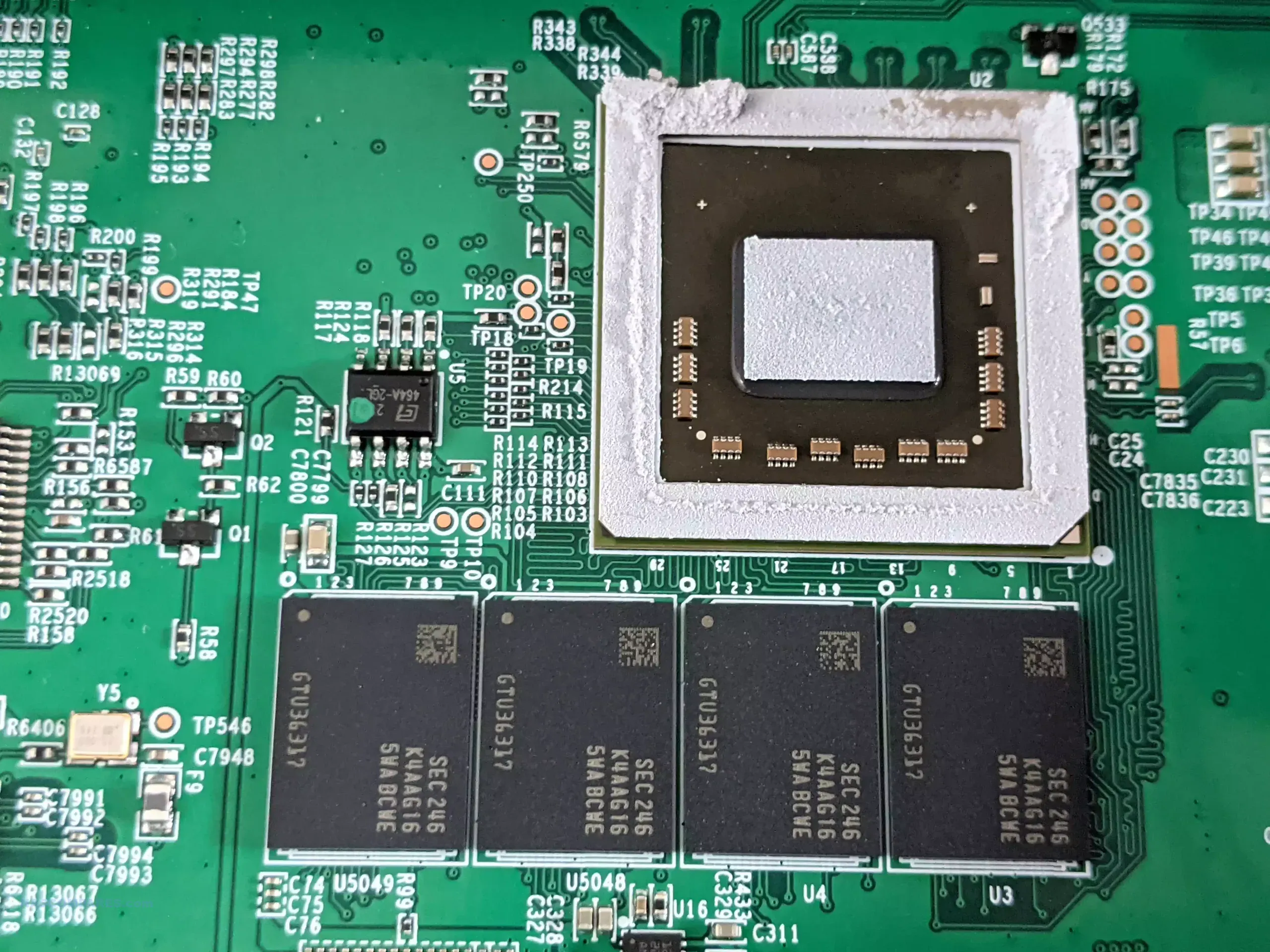
It comes with an ARM Cortex-A57 processor, 8GB DDR4 memory, and 10GbE networking, making it a solid choice for users who need simple storage and fast network access but don’t require extensive hardware expandability. Unfortunately, the RAM is non-upgradable, and there are no PCIe slots for future hardware expansion.
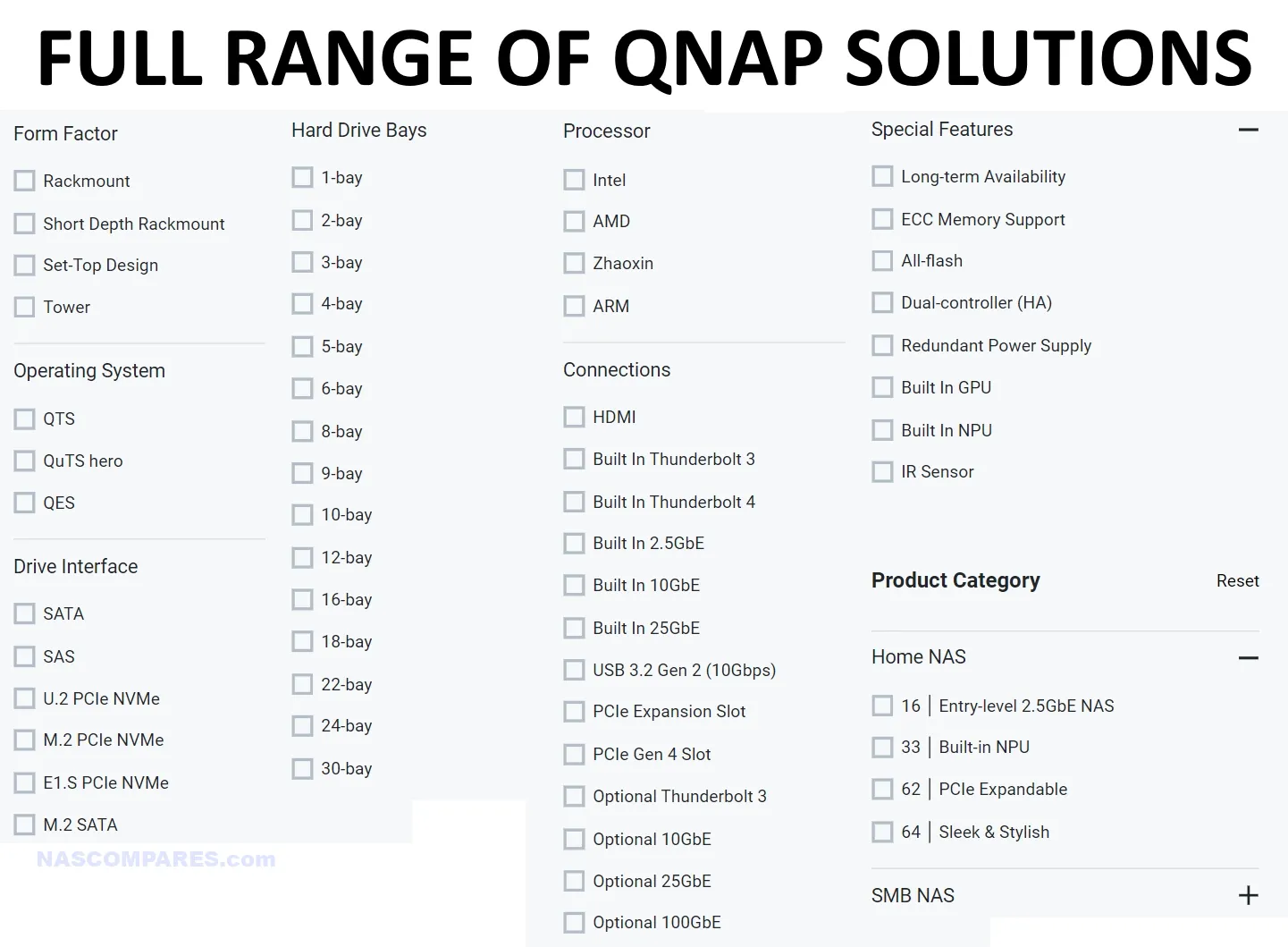
QNAP excels in hardware variety and expandability. The TS-464, for example, comes with an Intel Celeron quad-core processor, 4GB of RAM (expandable to 16GB), and a PCIe slot for adding features like 10GbE, NVMe SSDs, or additional storage controllers. Their rackmount systems, like the TS-832PXU, provide even more bays and include features like redundant power supplies, dual 10GbE ports, and scalable storage. Below is a comparison of key hardware features between the UniFi UNAS Pro and similar QNAP models:
| Feature | UniFi UNAS Pro
$499 NAS |
QNAP TS-464
$550-599 NAS |
QNAP TS-832PXU
SIMILAR HARDWARE NAS |
|---|---|---|---|
| Price | $499 | $499 | $800 |
| Bays | 7 SATA | 4 SATA | 8 SATA |
| Processor | ARM Cortex-A57 | Intel Celeron J4125 | ARM Cortex-A72 |
| Memory | 8GB DDR4 (Non-upgradable) | 4GB DDR4 (Expandable) | 4GB DDR4 (Expandable) |
| Networking | 1x 10GbE, 1x 1GbE | 2x 2.5GbE | 2x 10GbE, 2x 1GbE |
| PCIe Expansion | No | Yes | Yes |
| Redundant Power Supply | No | No | Yes |
While UniFi provides a solid and affordable 7-bay NAS with built-in 10GbE, QNAP offers more flexibility with hardware expansion and a broader range of options. For users who need scalable performance, QNAP’s offerings are better suited to handle growing data needs.
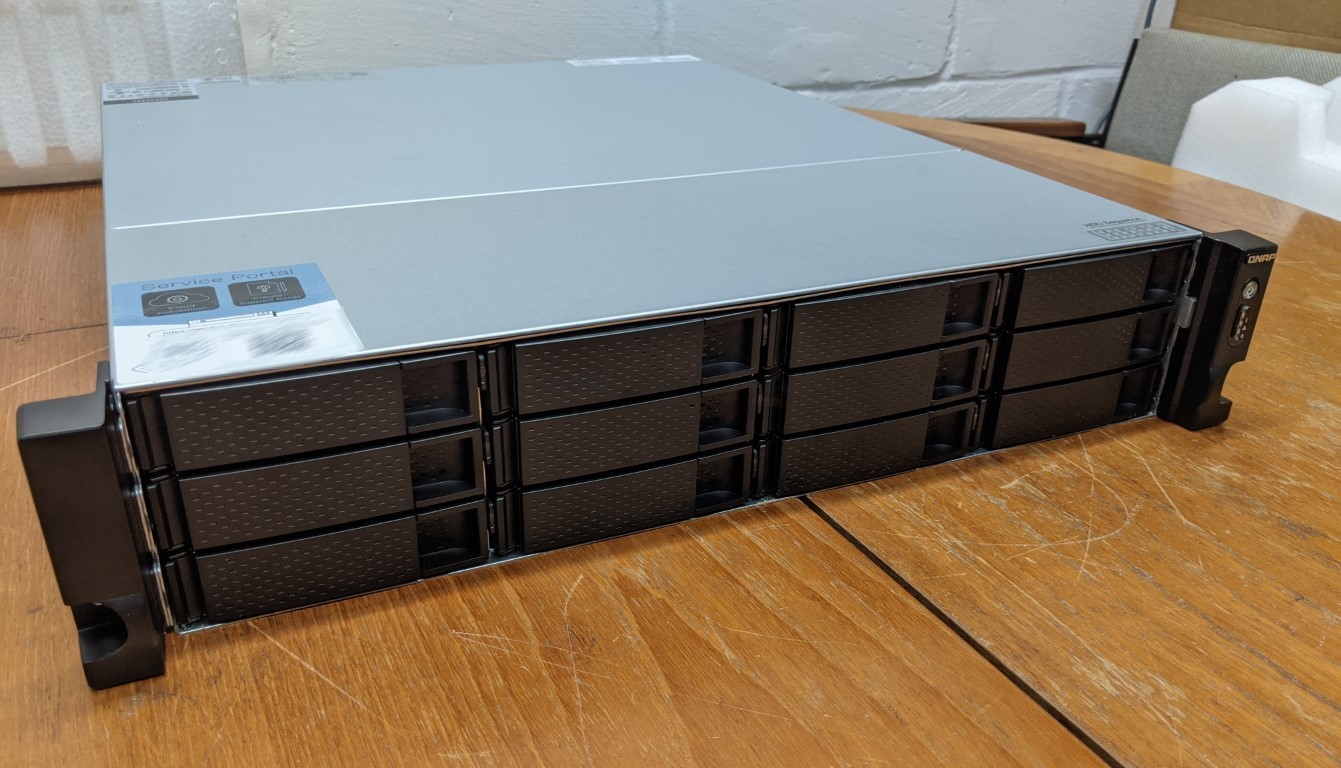
QNAP vs UniFi NAS – Software Presentation
The software user experience is a critical factor when comparing NAS systems. UniFi’s UNAS OS is simple and streamlined, focusing on tight integration with the broader UniFi ecosystem. It borrows much of its design from UniFi’s networking interface, offering users a text-heavy, analytical dashboard ideal for those familiar with UniFi’s network products.
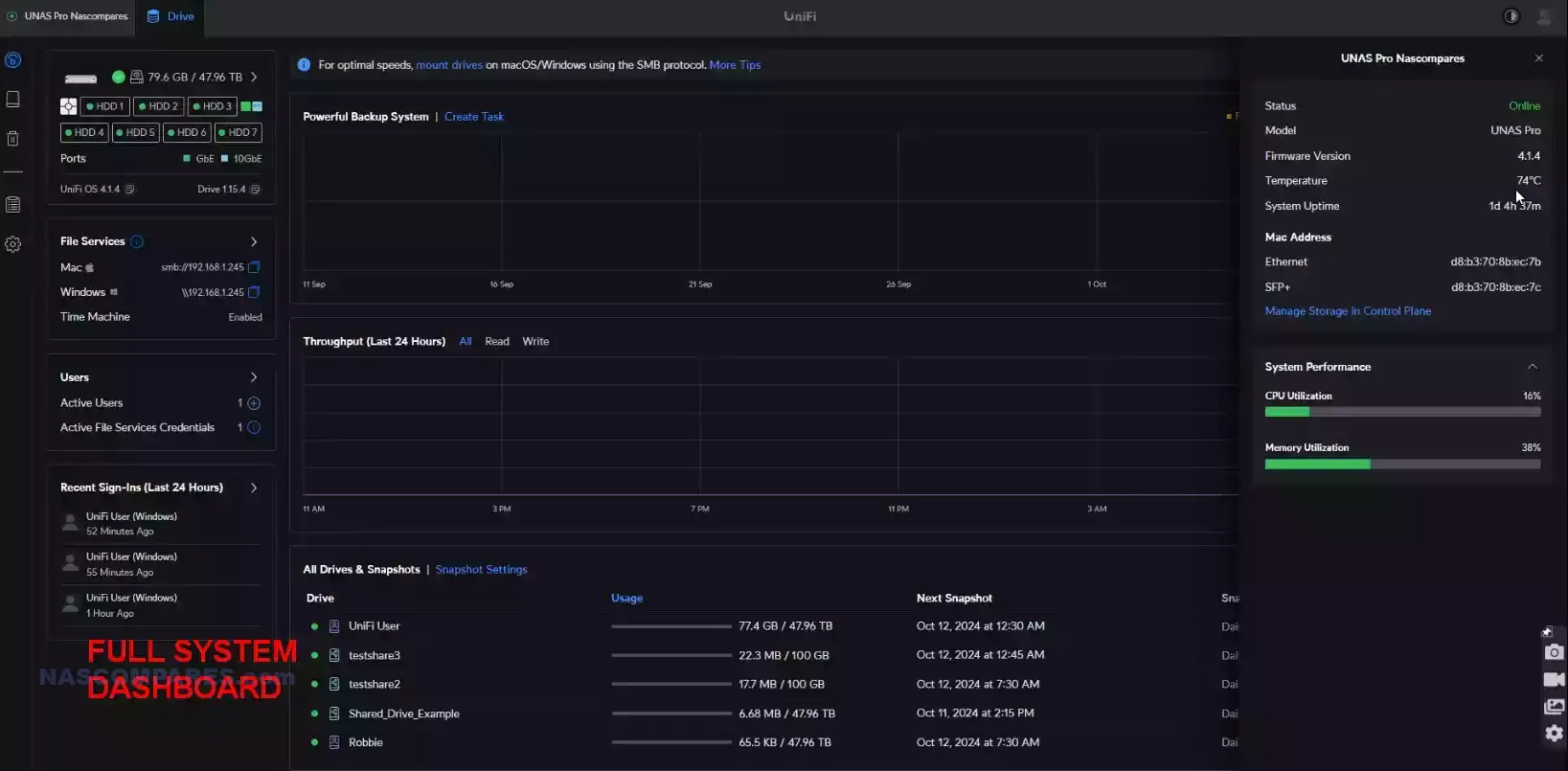
QNAP’s QTS (and its ZFS-based variant, QuTS hero) provides a more graphical and feature-rich interface, similar to Synology’s DSM. QTS presents users with a desktop-like environment, with drag-and-drop functionality, customizable icons, and an app-driven design. The interface is user-friendly and highly customizable, making it easy for both novice users and IT professionals to navigate.
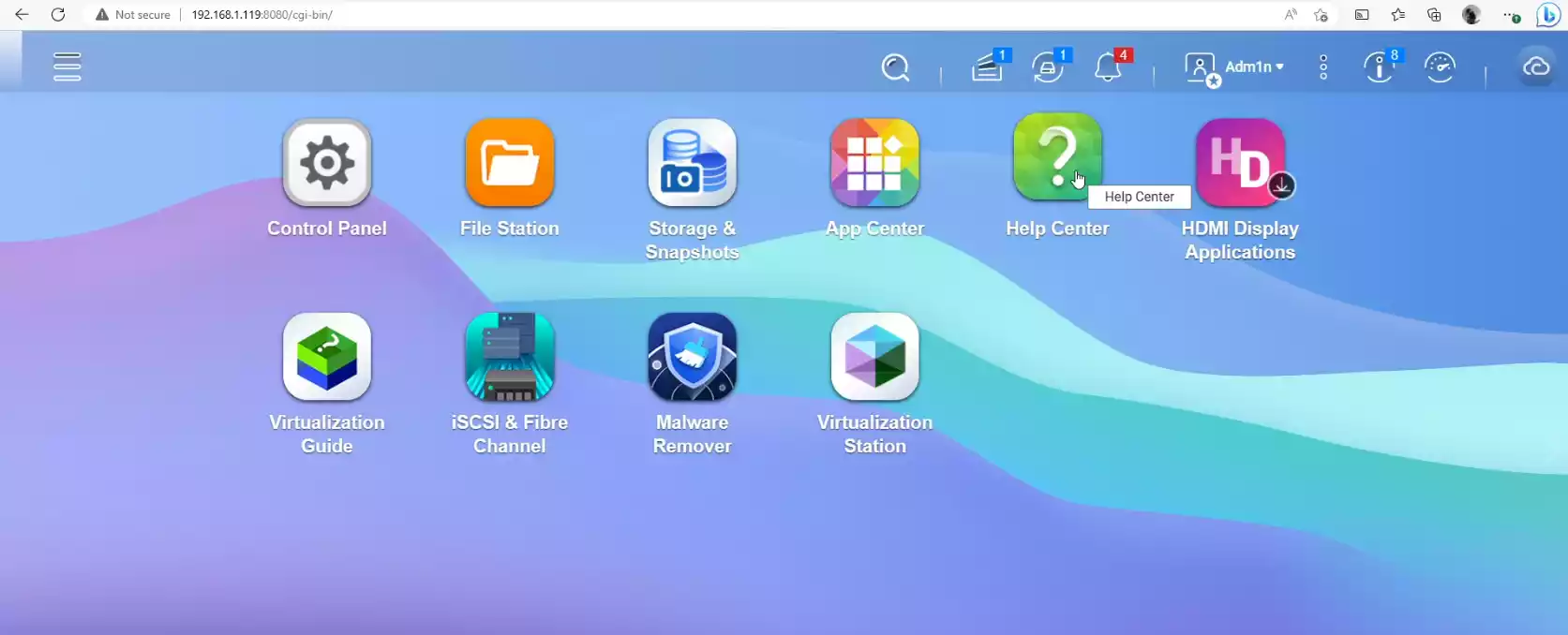
UniFi’s software is more minimalist, sticking to core NAS functions with an emphasis on system monitoring and performance analytics. While it works well for network administrators who prefer UniFi’s style, it lacks the richness of QNAP’s QTS, which includes a wide range of built-in applications and customization options.
| Feature | UniFi UNAS OS | QNAP QTS |
|---|---|---|
| User Interface Style | Text-based, data-centric | Graphical, desktop-like |
| Customization | Limited | Extensive |
| Third-Party App Store | No | Yes |
| Snapshot Interface | Simplified but functional | Advanced, easy-to-use |
| Multimedia Management | Basic file sharing | Plex, Video Station, Photo Station |
QNAP’s QTS is the better option for users looking for a feature-rich, customizable software experience, while UniFi’s UNAS OS provides simplicity and ease of use for those already embedded in the UniFi ecosystem.
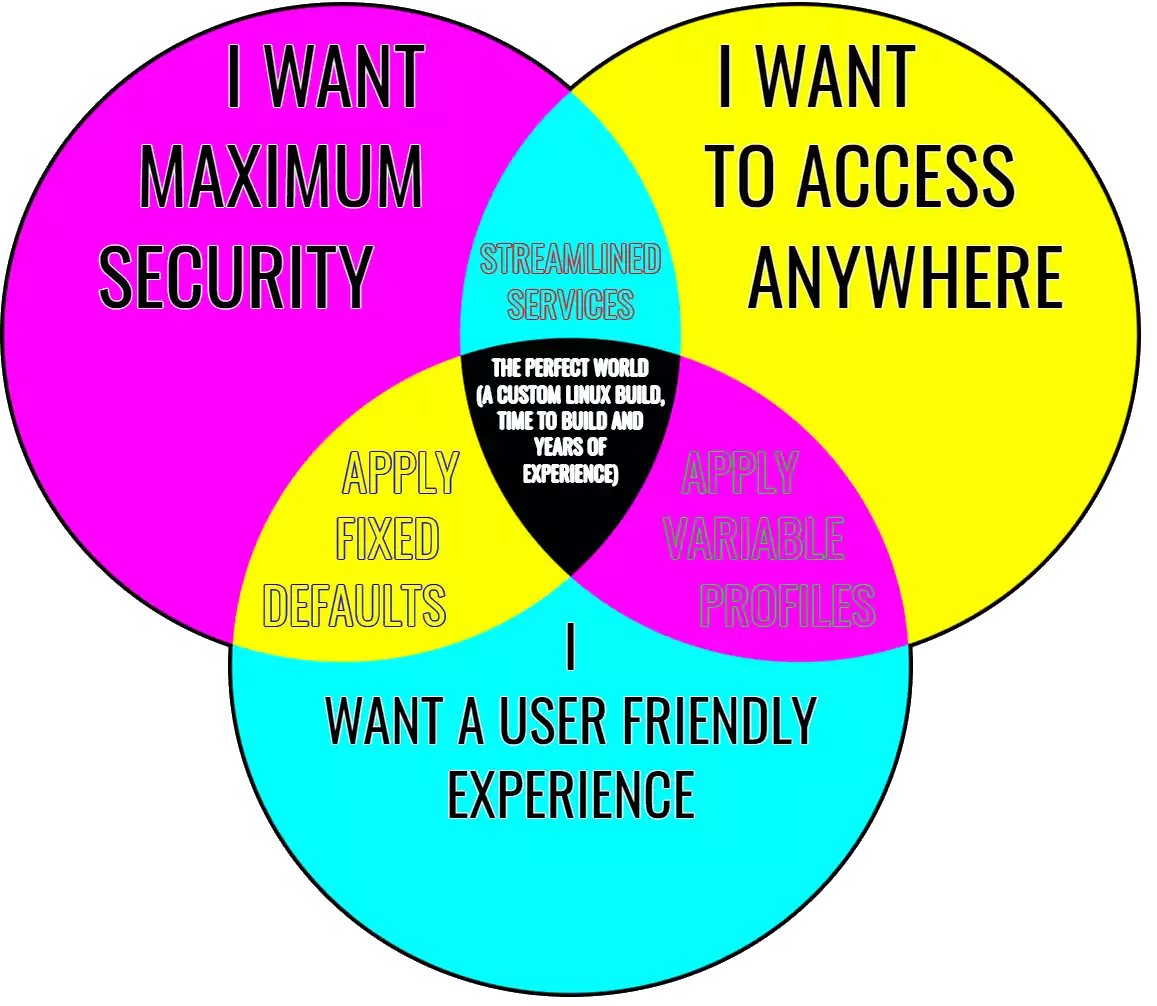
QNAP vs UniFi NAS – Security and Access
Both QNAP and UniFi offer strong security features, but their approaches differ based on their respective ecosystems.
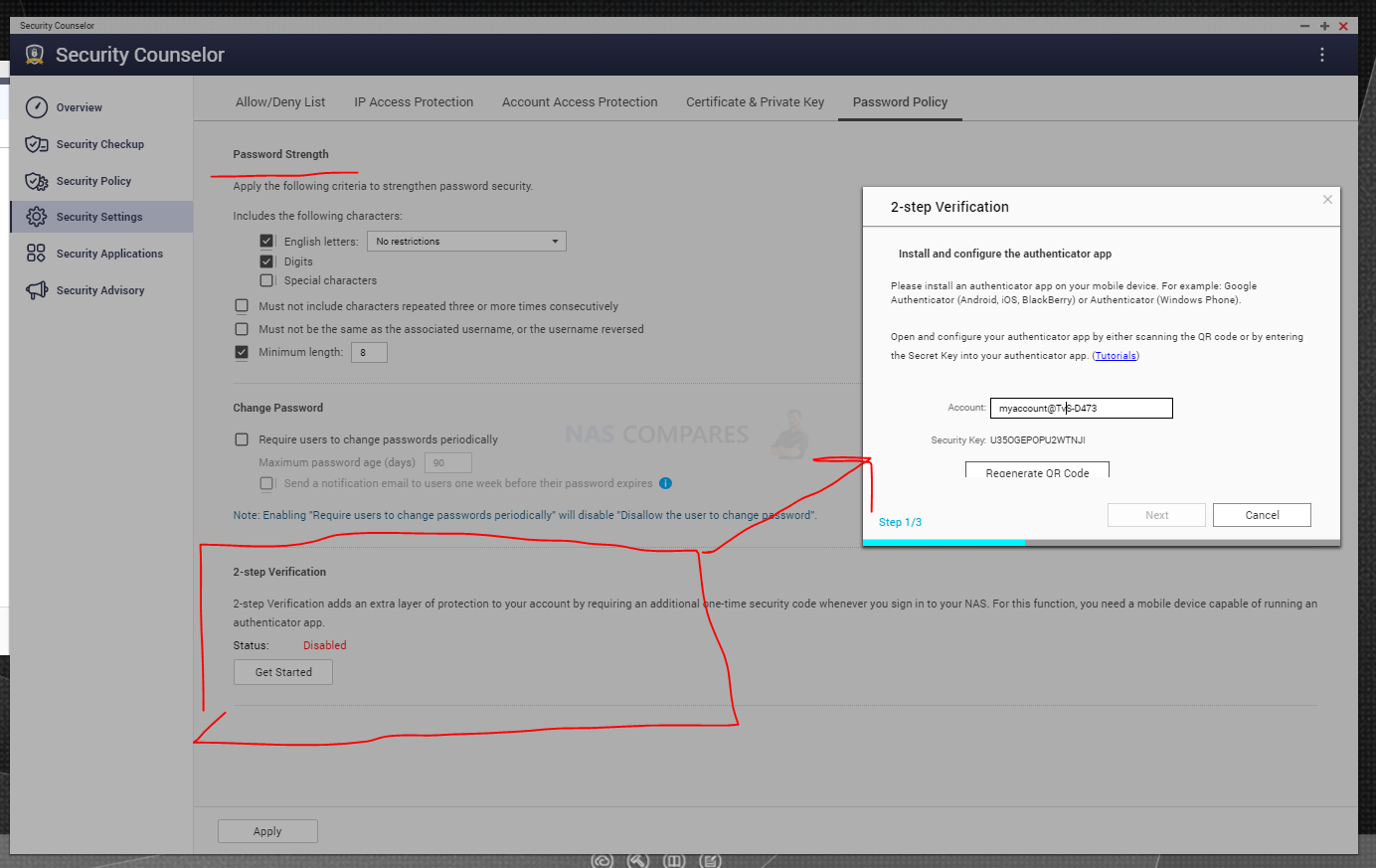
QNAP QTS includes comprehensive security features such as two-factor authentication (2FA), SSL certificates, built-in firewall configuration, and advanced ransomware protection. QNAP also supports a variety of third-party security tools and includes IP blocking, VPN integration, and security event monitoring, making it a robust choice for businesses with stringent security needs.
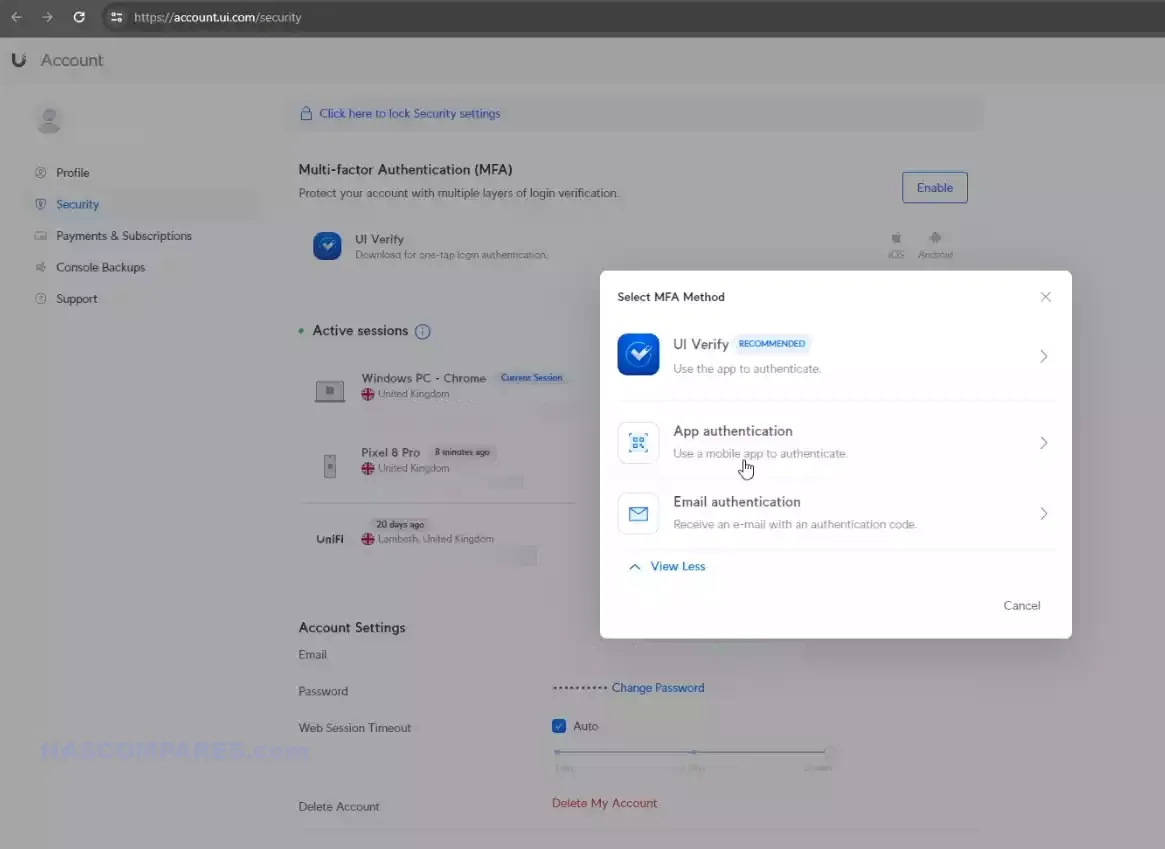
UniFi’s security features are more network-centric, borrowing heavily from the UniFi ecosystem. The UNAS Pro integrates with UniFi’s enterprise-grade networking tools, providing features like IP tracking, network monitoring, and the ability to monitor devices across the entire UniFi infrastructure. However, it is more reliant on UniFi’s own tools and lacks the flexibility of QNAP’s system-level security options.
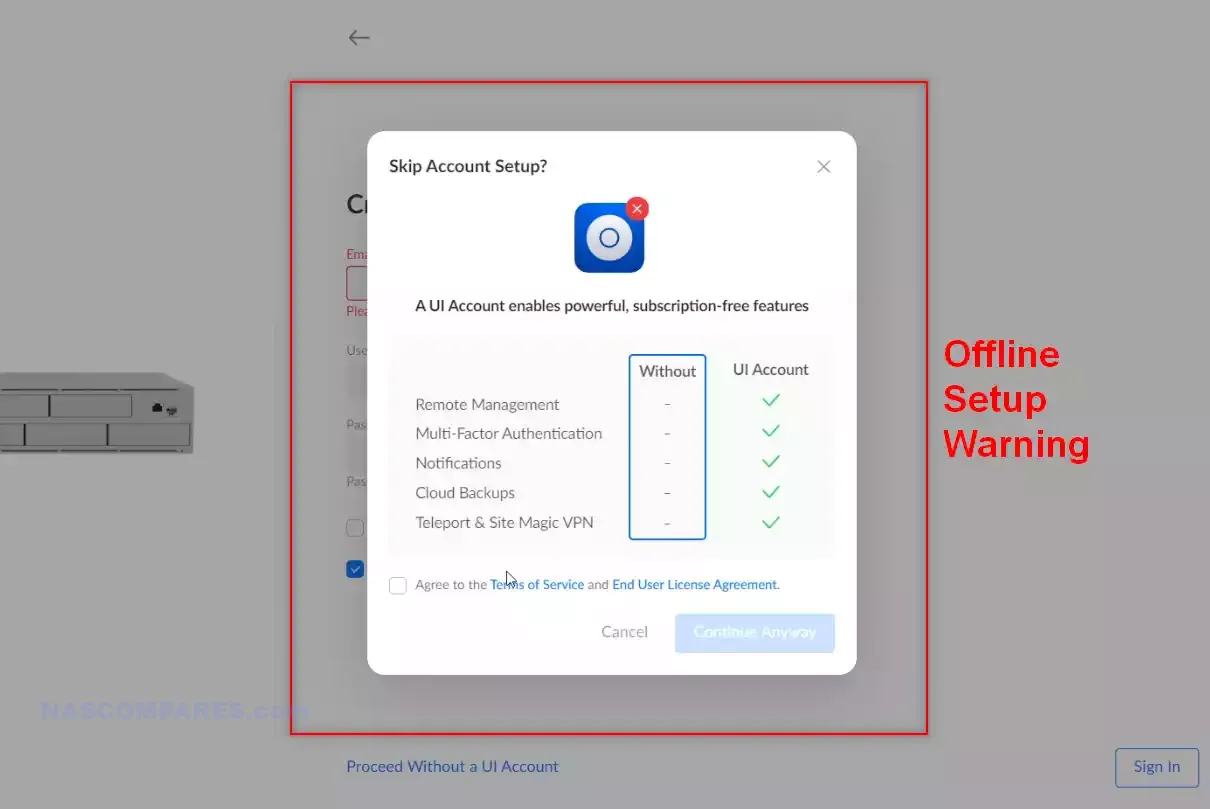
For businesses already using UniFi networking equipment, the seamless integration of security features across devices may be a major advantage. But QNAP’s more comprehensive NAS-specific security features give it the edge in environments that prioritize data protection at the device level.
QNAP vs UniFi NAS – Software Features
QNAP’s QTS is known for its extensive feature set, providing a wide array of applications for file management, backups, virtualization, and multimedia. QNAP’s built-in app store includes hundreds of apps, including popular third-party solutions like Plex for media streaming, Docker for containerized applications, and Virtualization Station for running virtual machines.
QNAP also excels in providing enterprise features like iSCSI management, snapshot support, hybrid cloud integration, and advanced RAID configurations. Their backup solutions, including Hybrid Backup Sync and Hyper Data Protector, are highly regarded for multi-platform backup support, ensuring data can be securely stored across different locations and devices.
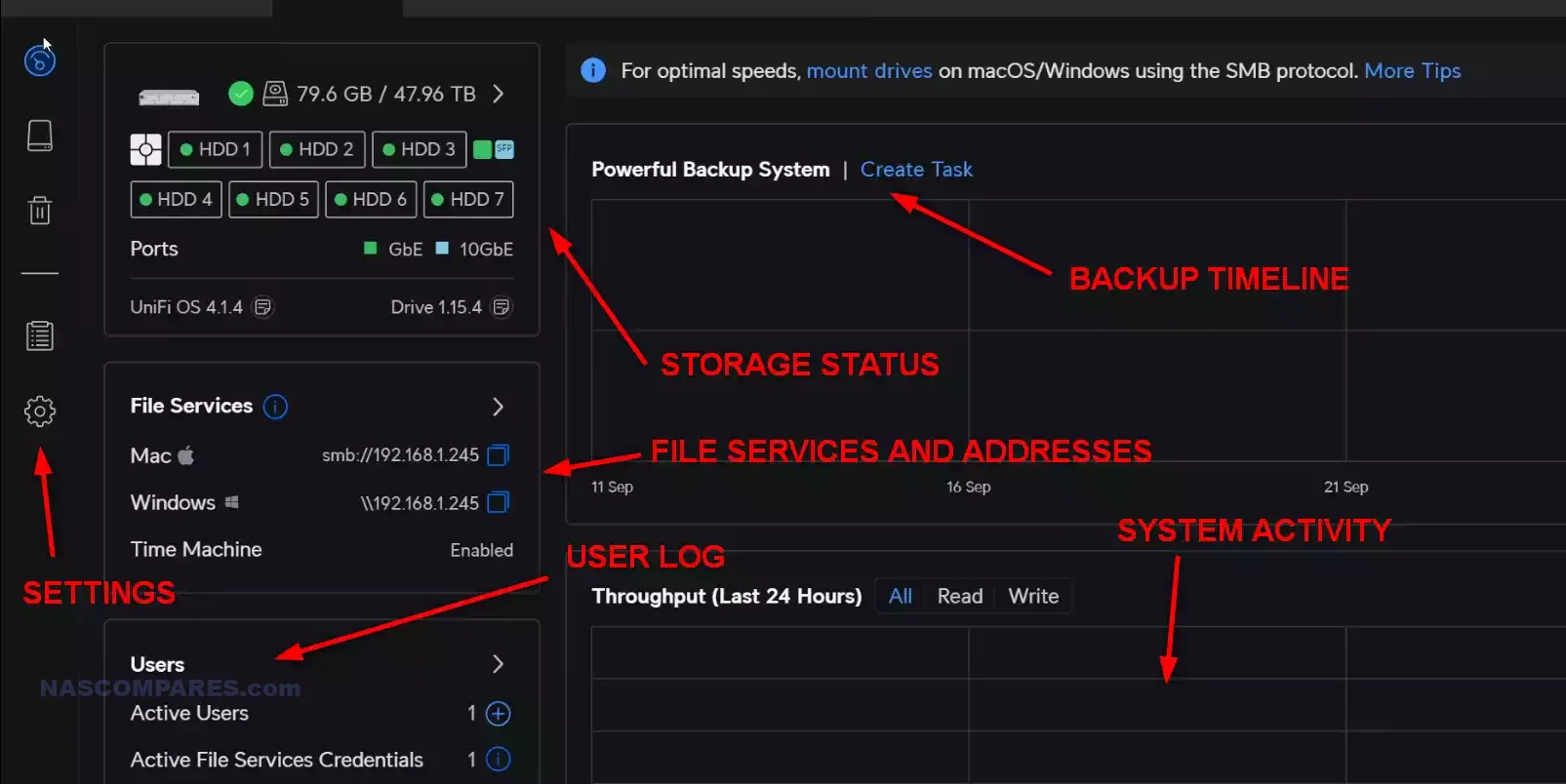
In contrast, UniFi’s UNAS OS focuses on core NAS functions with tight integration into the UniFi ecosystem. While it provides essential file storage, backup scheduling, and snapshot capabilities, it lacks support for more advanced features like Docker or virtual machines.
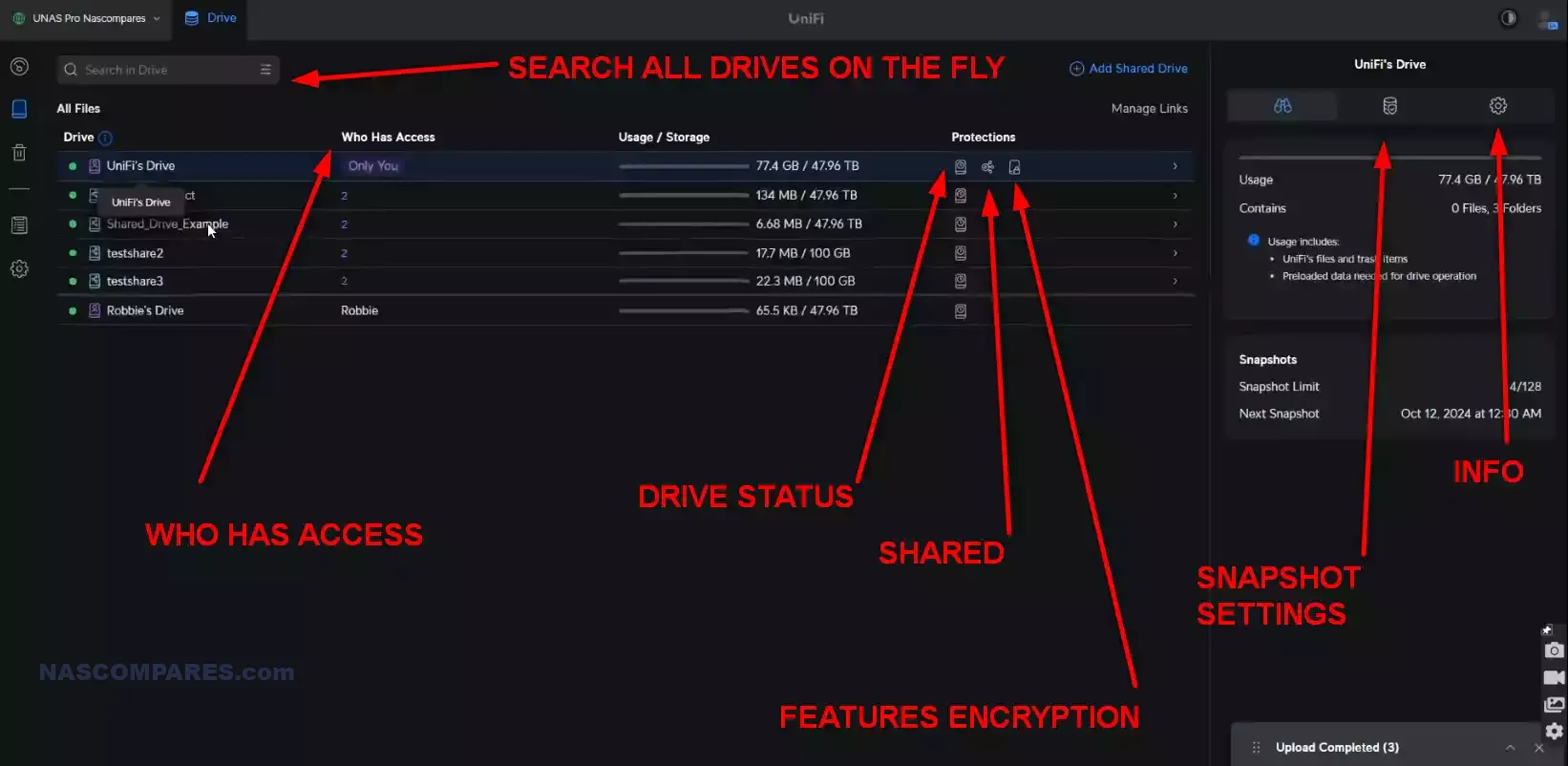
The UNAS OS doesn’t have a dedicated app store, meaning users are limited to the built-in functions, which may not satisfy power users or businesses looking for extensive features. Whereas QNAP has had a number of years to fully expand their software portfolio.
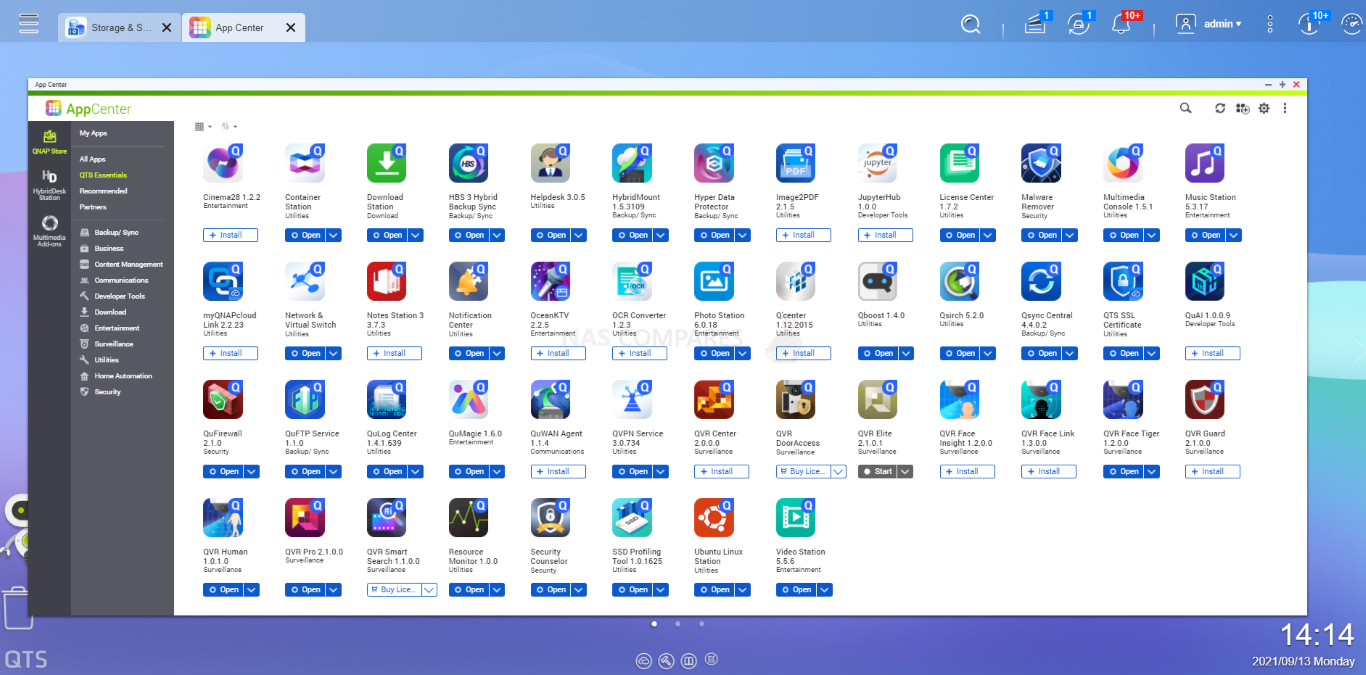
Key Examples of QNAP’s Advanced Software Features:
- Plex: Media server integration for streaming movies, music, and photos to multiple devices.
- Docker: Support for containerized applications, allowing users to run isolated apps and services.
- Virtualization Station: Enables the creation and management of virtual machines on the NAS.
- QVR Pro / QVR Elite: Full-featured NVR solution for video monitoring and security.
To give you some more perspective (and somewhat damningly), her is the full list of modern NAS appliances and uses that you might consider the defacto full list of services that NAS solutions can/do provide in 2024/2025, and how QNAP and UniFi UNAS compare and contrast:
| Software / Service | QNAP NAS (QTS)
|
UniFi UNAS Pro
|
|---|---|---|
| Operating System | QTS 5.x, QuTS Hero (ZFS-based OS) | UniFi OS (UNAS-specific OS layer) |
| User Interface | Customizable with advanced dashboard options | Simplified interface, single-pane dashboard, focused on network metrics |
| Mobile Apps | Qfile, Qmanager, Qvideo, Qmusic, Qphoto, and more | UniFi Mobile App (Drive management, Snapshots, Backups) |
| Virtualization | Virtualization Station (Supports Windows, Linux, and QTS) | No virtualization support |
| Container Support | Container Station (Supports Docker and LXC) | No Docker or container support |
| Surveillance | QVR Pro (8 free camera licenses, additional paid licenses) | No support for UniFi Protect (at launch) |
| Multimedia Streaming | Plex, QNAP Photos, Video Station, Music Station | No multimedia apps (no Plex or streaming apps support) |
| RAID Support | RAID 0, 1, 5, 6, 10, RAID50, RAID60, Basic, JBOD | RAID 1, 5, 10 (Native – with RAID 6 coming soon after launch) |
| Snapshot Support | Yes (QTS with EXT4 and QuTS Hero with ZFS) | Yes (Snapshots with scheduling and backup options) |
| Cloud Backup | Hybrid Backup Sync (Amazon S3, Google Drive, Dropbox, OneDrive, etc.) | Google Drive (Limited cloud backup options) |
| Local Backup Solutions | Hybrid Backup Sync, QNAP HBS 3, Snapshot Replica | Local NAS backups supported (NAS to NAS) |
| File Synchronization | Qsync Central (Supports syncing with Windows, macOS, Android, and iOS) | SMB, basic file synchronization with mobile app |
| Backup for PCs | NetBak Replicator (For Windows PCs) | Basic backup for Windows, no advanced backup suite |
| Backup for macOS | Time Machine Support | Time Machine support (via SMB) |
| External Backup | USB, eSATA, Thunderbolt Backup (with compatible models) | No external backup support |
| Cloud Integration | HybridMount (Supports mounting cloud services for file sharing) | Google Drive cloud sync only |
| Security Features | 2FA, firewall, SSL certificates, QuFirewall, QuWAN (SD-WAN), VPN | 2FA, SSL certificates, integration with UniFi Identity for SSO |
| Encryption | AES 256-bit full volume and folder-based encryption | Full-volume and folder encryption |
| Multimedia Apps | QNAP Photos, Video Station, Music Station, Plex | No multimedia apps available |
| Third-Party App Store | QTS App Center | No third-party app store |
| Mobile Backup | Qsync (For mobile devices) | Basic mobile backup via UniFi Drive |
| Cloud Sync | Hybrid Backup Sync, Dropbox, Google Drive, Microsoft OneDrive | Google Drive only |
| Collaboration Tools | QNAP Notes Station, QmailAgent, and Qcontactz | No collaboration tools |
| Virtualization Backup | Hyper Data Protector (VMware, Hyper-V) | No virtualization backup |
| AI-Powered Apps | QuMagie (AI-powered photo management), Qsirch (Search engine) | No AI-powered apps |
| High Availability (HA) | QNAP High Availability (for redundancy) | No high availability features |
| NAS as VPN Server | Yes (QVPN, supports PPTP, OpenVPN, L2TP/IPsec, WireGuard) | Yes (VPN integration with UniFi Gateway and Identity Enterprise) |
| App Virtualization | Docker, Linux Station (Ubuntu desktop in a container) | No virtualization or Docker support |
| Remote Access | myQNAPcloud (secure remote access without complex configuration) | UniFi cloud access (requires UI.com account) |
| Cloud Applications | QNAP CloudLink | No cloud applications beyond Google Drive sync |
| Video Editing | QuMagie AI-based tools, Plex | No video editing or AI tools |
| Remote Replication | RTRR (Real-time remote replication), Snapshot Replica | NAS-to-NAS backup and remote replication supported |
| Multi-Version Backups | HBS 3 (Hybrid Backup Sync, supports multi-versioned backups) | Yes (multi-versioned backups via Snapshots) |
| Email Server | QmailAgent | No email server functionality |
| Web Server | QTS Web Server (Supports hosting multiple websites) | No web server support |
| Music Streaming | Music Station, Plex | No music streaming or audio apps |
| Drive Health Monitoring | QNAP Drive Health Management (HDD and SSD wear monitoring) | SMART drive monitoring |
| Antivirus | McAfee Antivirus, ClamAV, third-party apps | No antivirus tools available |
| PCIe Expansion | Yes (supports 10GbE cards, M.2 SSD cache cards, graphics cards) | No PCIe expansion options |
| Thunderbolt Support | Yes (on certain models, ideal for media editing workflows) | No Thunderbolt support |
| SSD Caching | Yes (supports NVMe and SATA SSD caching on select models) | No SSD caching |
| ZFS File System | Yes (QuTS Hero models support ZFS, others use EXT4) | No ZFS support, EXT4 only |
| Ransomware Protection | Yes (dedicated security updates, Snapshot protection, QNAP Malware Remover) | Yes (Snapshots, network security via UniFi Gateway integration) |
| Browser-based access | Yes (Full access via web browser, highly customizable interface) | Yes (Single-pane UI via web browser) |
| NAS-to-NAS sync | Yes (via Hybrid Backup Sync and RTRR) | Yes (Basic NAS-to-NAS sync) |
| Plex Media Server | Yes (App available in QNAP App Center) | No Plex or multimedia server support |
| Built-in AI Tools | QuMagie (AI-powered photo management), Qsirch (AI-powered search) | No AI-powered tools |
QNAP vs UniFi NAS – Hardware and Storage Expandability
When it comes to hardware and storage expandability, QNAP offers far more flexibility than UniFi. QNAP NAS systems often come with PCIe slots for expanding network connectivity or adding NVMe SSDs for caching. Models like the TS-464 and TS-832PXU support external expansion units, allowing users to add more drive bays as their storage needs grow.
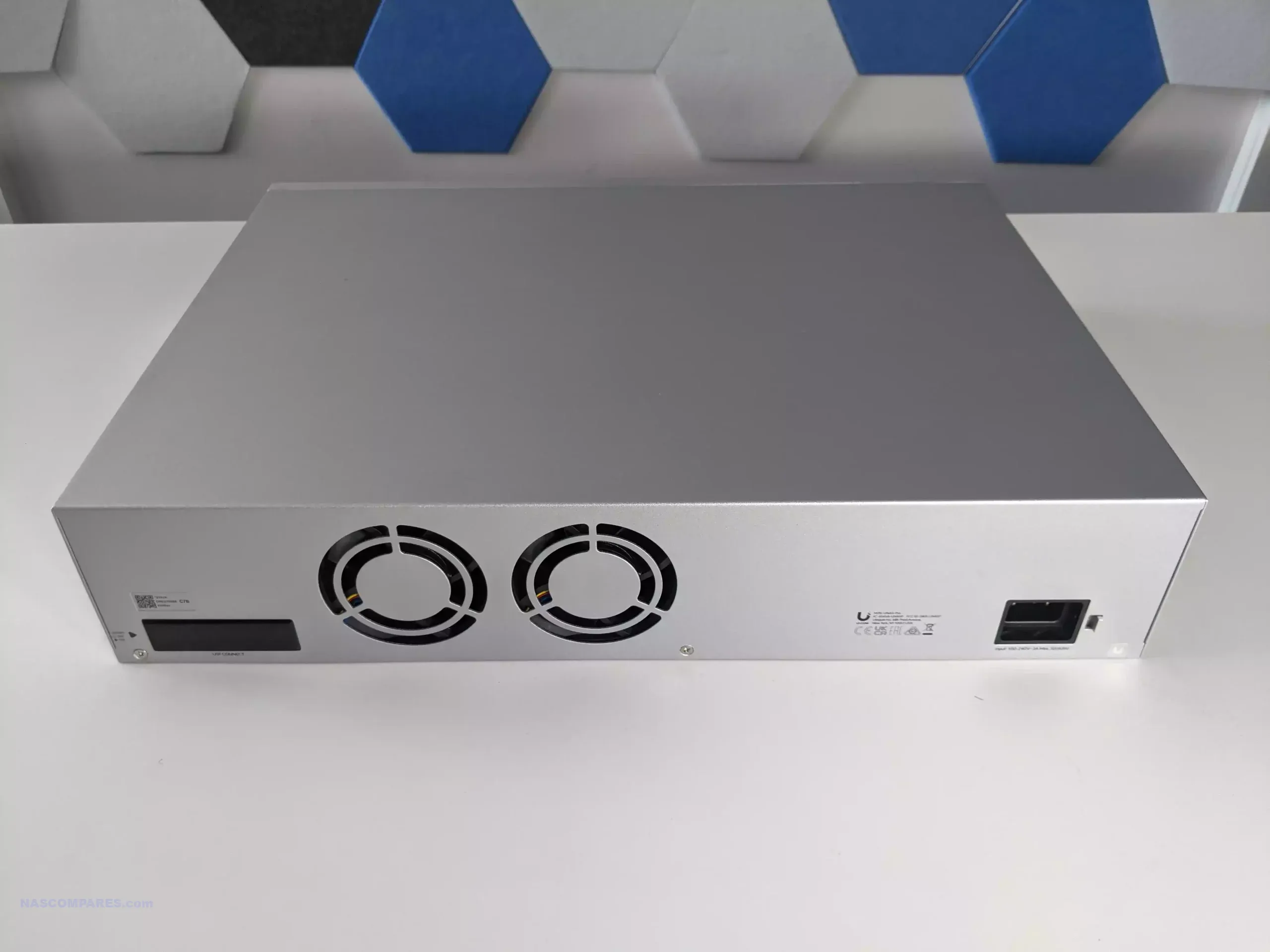
UniFi’s UNAS Pro, on the other hand, is a more fixed solution. With 7 drive bays, it offers a solid starting point for SMBs or home users, but there is no option to add more storage beyond the built-in bays. The UNAS Pro also lacks PCIe slots, meaning users cannot upgrade to faster networking options or add SSD caching for improved performance.
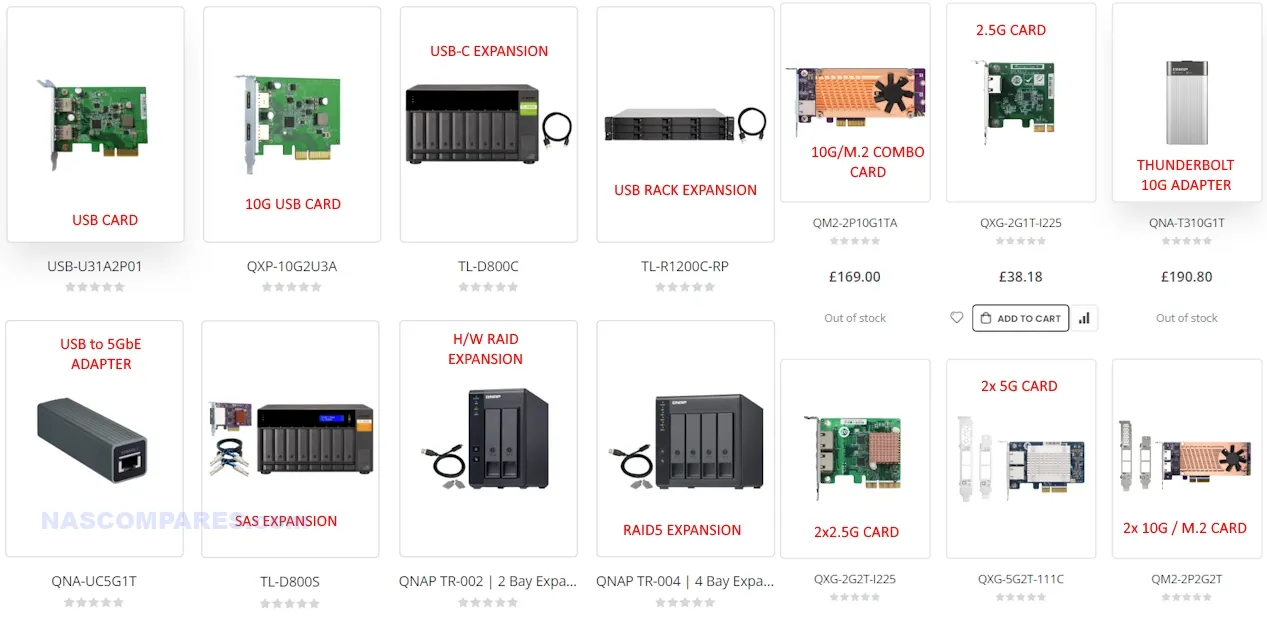
For businesses that expect to scale their storage over time, QNAP’s expandability is a major advantage. Users can add external storage, upgrade to faster networking, or implement SSD caching to improve performance as their data needs increase.
Key Examples of QNAP’s Expandability:
- PCIe Slots: For adding 10GbE, 25GbE, 40GbE and 100GbE cards, SSD caching, or additional storage controllers that combine them BOTH!
- Expansion Units: Add-on units like the TL and TR Series allow users to easily increase storage capacity.
- NVMe SSD Support: Available on many models for high-speed caching, improving read and write speeds.
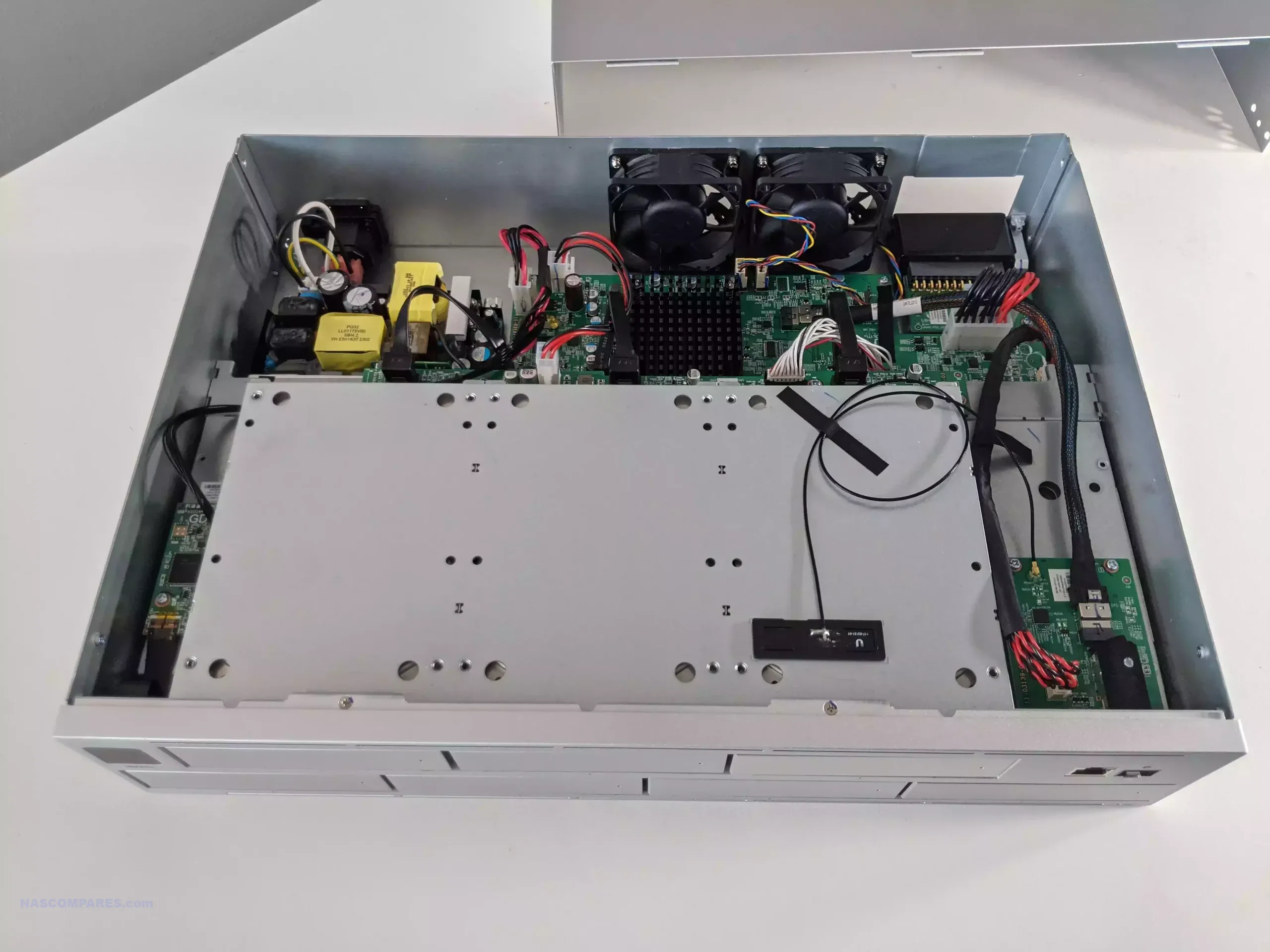
QNAP vs UniFi NAS – Verdict and Conclusion

Choosing between QNAP and UniFi NAS systems depends largely on your specific requirements and whether you’re looking for a versatile, expandable solution or a streamlined, network-centric device. QNAP is the go-to choice for users who need flexibility and advanced features, offering a comprehensive ecosystem of software solutions, virtualization, and scalability through PCIe slots, NVMe caching, and external storage expansion units. Its rich app store and high-end features like Docker, Virtualization Station, and support for complex storage configurations make it a strong contender for businesses, creative professionals, and power users who require robust performance and the ability to scale as their needs grow.
On the other hand, UniFi’s UNAS Pro is designed for simplicity and tight integration within the existing UniFi network infrastructure. With a focus on ease of use, basic NAS functions, and seamless deployment, it’s an appealing option for small businesses or home users already invested in the UniFi ecosystem. While it lacks the depth of features seen in QNAP, such as virtualization, multimedia management, and extensive software tools, UniFi’s UNAS Pro excels in providing network-level security, easy file management, and hassle-free backups, particularly for those who value remote access and centralized control over their network and NAS devices. Its built-in 10GbE networking capabilities also make it an affordable choice for users seeking faster connectivity without the need for additional expansions.
![]()
Ultimately, QNAP is ideal for users who prioritize feature-rich software, extensive hardware expandability, and the ability to run advanced applications. Its higher cost is justified by its robust capabilities and long-term flexibility. However, if your focus is on network integration, simplicity, and affordability, UniFi’s UNAS Pro offers a practical, budget-friendly solution that fits seamlessly into the broader UniFi environment. Both platforms offer distinct advantages, but the decision will come down to whether you need a powerful, scalable NAS or a simple, well-integrated storage system.
| Feature | QNAP Pros |

UniFi Pros |
 UniFi Cons UniFi Cons |
|
|---|---|---|---|---|
| Software Features | Extensive app store, Docker, VM support | Seamless integration with UniFi ecosystem | Higher cost for advanced models | Limited software features |
| Hardware Expandability | PCIe slots, NVMe caching, external expansion | Compact design, built-in 10GbE | Expandable hardware can drive up costs | No SSD caching or PCIe slots |
| Multimedia Management | Plex, Video Station, and Photo Station | Simple file sharing with Drive | Removal of Video Station in some models | Lacks dedicated multimedia management |
| Backup Solutions | Hybrid Backup Sync, Hyper Data Protector | Basic cloud backups via Google Drive | Some apps feel dated compared to competitors | Lacks advanced backup features |
| Virtualization Support | Docker and Virtualization Station | Tight integration with UniFi Controller | Not all models support high-end VM needs | No Docker or virtualization support |
| Security Features | Comprehensive NAS-specific security tools | Strong network-level security integration | Advanced security might be overkill for small users | Fewer security options for the NAS itself |
| Storage Management | QTS/QuTS hybrid RAID, multiple storage pools | Simple and easy-to-use snapshot management | Can be more complex to set up advanced storage features | Fixed hardware, no expandability beyond 7 bays |
| Price Flexibility | Broad range of NAS models at different prices | Affordable NAS with solid networking | Higher initial cost for advanced models | No pricing flexibility with limited hardware options |
| Complexity | Powerful features but requires a steeper learning curve | Simple, basic setup for UniFi ecosystem | Can be more complex for less experienced users | Basic compared to competitors |
| Software Maturity | Mature software with a wide range of features | Simple, early-stage OS but integrated well | Some apps feel outdated compared to competitors | Early-stage OS with fewer features |
| NAS-Specific Security | Advanced security features for robust data protection | Strong network-level security integration | Might be too complex for smaller setups | Fewer NAS-specific security tools |
| Setup Complexity | Can be complex to set up advanced features | Easy to set up, integrates well with UniFi devices | Requires technical expertise for full feature implementation | Very basic setup and customization options |
| Where to Buy |  |
 |
 |
 |
📧 SUBSCRIBE TO OUR NEWSLETTER 🔔
🔒 Join Inner Circle
Get an alert every time something gets added to this specific article!
This description contains links to Amazon. These links will take you to some of the products mentioned in today's content. As an Amazon Associate, I earn from qualifying purchases. Visit the NASCompares Deal Finder to find the best place to buy this device in your region, based on Service, Support and Reputation - Just Search for your NAS Drive in the Box Below
Need Advice on Data Storage from an Expert?
Finally, for free advice about your setup, just leave a message in the comments below here at NASCompares.com and we will get back to you. Need Help?
Where possible (and where appropriate) please provide as much information about your requirements, as then I can arrange the best answer and solution to your needs. Do not worry about your e-mail address being required, it will NOT be used in a mailing list and will NOT be used in any way other than to respond to your enquiry.
Need Help?
Where possible (and where appropriate) please provide as much information about your requirements, as then I can arrange the best answer and solution to your needs. Do not worry about your e-mail address being required, it will NOT be used in a mailing list and will NOT be used in any way other than to respond to your enquiry.

|
 |
Do MORE with Your M.2 Slots - GREAT M.2 Adapters!
5 Top Tips for Content Creators Buying a NAS
Terramaster F4 SSD NAS - Should You Buy? (Short Review)
Minisforum N5 Pro NAS Review - Did Minisforum just WIN at NAS?
What Can You ACTUALLY DO with HDMI on Your NAS?
Best NAS for under $499
Access content via Patreon or KO-FI


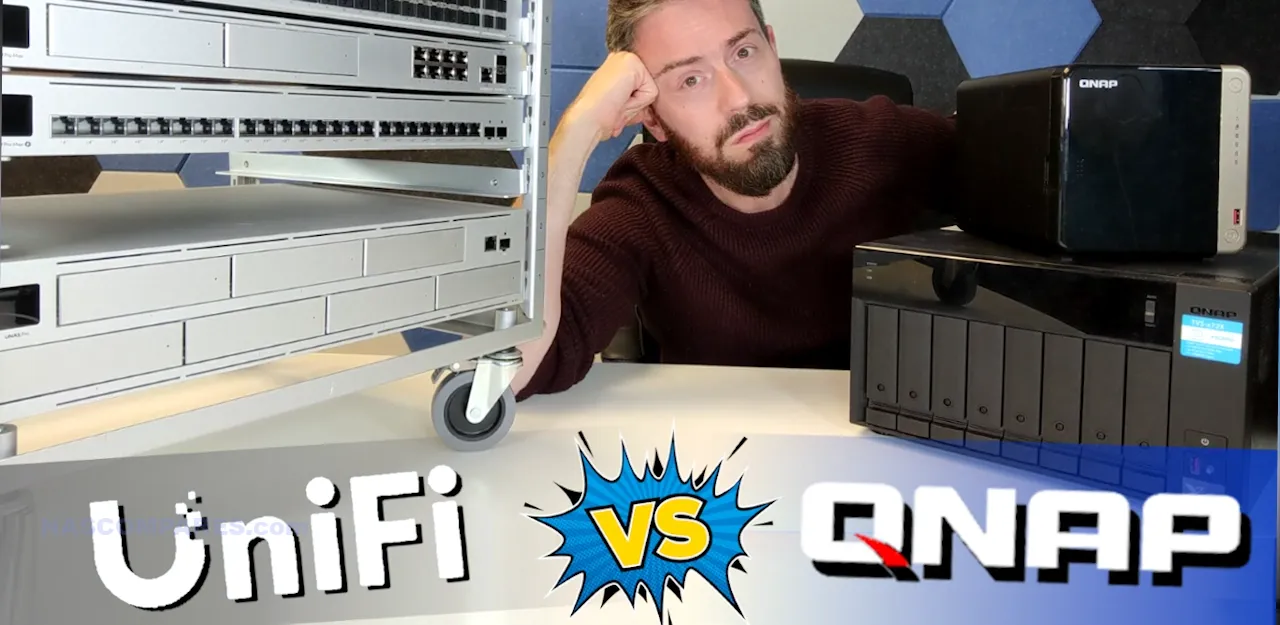




Dockers and VM’s do not belong on storage
REPLY ON YOUTUBE
Does everything… stores files, shares files, and books your dentist appointment. Brilliant.
REPLY ON YOUTUBE
RE: 7:30, it would be better to see dual PSU’s, but Ubiquiti’s “Power Back” (USP-RPS) isn’t a “backup battery failover” it is an external PSU. It is confusing, but that’s how they do their non-enterprise redundant PSUs.
REPLY ON YOUTUBE
Is there no way to disable RAID at all? Only have 2 HDD right now, kinda want to have access to both for storage.
REPLY ON YOUTUBE
Had mine for two weeks now and it’s a fine NAS but a few bugs. It does desperately need an update. SMB issues when viewing larger MP4 videos want to download instead of streaming over local network.
REPLY ON YOUTUBE
Does anyone suspect UniFi will release a non-pro NAS?
REPLY ON YOUTUBE
The NAS hat a bunch of minor issues. It does not properly test disk drives inserted. I used an older but not failing one and this causes a ton of problems like random disconnects. Then with 2 brand new 8TB drives copying thousand of small files (like 100GB worth) can take hours or even days! I have let Unifi know about this days ago and so far just one canned response. It is NOT fast in may experience even with all 10gbe connections. Just keeping it real folks.
REPLY ON YOUTUBE
Best Review
REPLY ON YOUTUBE
Hi, can you advise please, if I connect UNAS Pro to UDM-pro via 10G SFP+, and then from the UDM-Pro connect to my windows PC using 10G SFP+, will I achieve the roughly speeds of 500-850 MB/s (RAID 5 using 3 x Seagate Exos X24 20gb drives). Or do I need a 10G SFP+ switch?
REPLY ON YOUTUBE
This NAS vs. Synology???
REPLY ON YOUTUBE
Mine just arrived and I’m excited to get it up and running. Will use it to replicate from my Unraid box as well as use it to replace Nextcloud.
REPLY ON YOUTUBE
Why should I buy this NAS? Out of curiosity perhaps, but certainly not for practical reasons! Look at a QNAP, Synology and even a UUGREEN NASync DXP4800 Plus. Maybe a 4 bay instead of a 7 bay, but much better hardware and software and therefore possibilities. If I would buy one of these brands, and I only use the bare NAS properties, then you still have a 20x better NAS that is not only more durable, but also many times as much as a UniFi UNAS Pro. By the way, just leave the Pro out of it, Marketing-wise it may sound nice, but it certainly is not. It is a big marketing launch from UniFi anyway. But an experienced NAS user really knows better.
REPLY ON YOUTUBE
wish this would come back in stock
REPLY ON YOUTUBE
I’ve also discovered the two ports, are not for failover. You can only use one at a time. UniFi advised you can only use SFP+ or RJ45. Not both at the same time.
REPLY ON YOUTUBE
I’ve been testing my UNAS Pro with four Seagate 18tb Exos drives in the “more protection” setting. I have uncovered a major issue it has with being unable to download files completely to any iPhone via the Identity app. Regardless of Wifi, or LTE (5G or 4G mobile), if you use Safari, it failed on every file to be able to download a file in its entirety. It would download half an image or half a wav or mp3 or mp4, but not the whole file. Despite multiple emails to UniFi and going through their escalation team they were unable to identify the issue until the end when I worked out it is an issue with Safari. Switching to Google Chrome as the browser on the iPhone, it works! I have advised UniFi and they say they will investigate and look at a possible update as they realise now there is an issue with the driver and a bug in its ability to allow for sharing and downloading to the files app on the iPhone via Safari. Thought I’d share for anyone else experiencing this issue. Would be keen to know if you have found this also.
REPLY ON YOUTUBE
FANTASTIC REVIEW, ROB!!!
Thanks a lot!
I am a long time Ubiquiti user, both UniFi (SOHO/semi-Pro use) and UISP (professional use) and although the lacking twistles that others can offer, as you say, this NAS is almost the ideal companion of a full UniFi network.
I’d lke the WORM feature as you mentioned, but hopefully I think they will put in there as soon as possible.
It is very interesting that an early firmware fron Ubiquiti would be as complete and stable as this one, at the moment of the launch.
In my memory, this is almost the first time it happens… ????
Price wise, it is a bargain!
I’ll purchase it, maybe the new revisions in mid 2025… ????
REPLY ON YOUTUBE
QVR Pro runs on ARM.
REPLY ON YOUTUBE
This is first gen. Give time and they will get up to speed.
REPLY ON YOUTUBE
Non-starter for me without an SHR type option. Too bad.
REPLY ON YOUTUBE
Thecus 7700 pro was a seven drive nas
REPLY ON YOUTUBE
The lack of a professional cloud backup with „time travel“ and restore options are stopping me from using this device
REPLY ON YOUTUBE
What a long way to say what a disappointment this is.
REPLY ON YOUTUBE
I just need a nas for file and picture storage
REPLY ON YOUTUBE
Great review! Thank you.
Just to clarify… I cannot have 2x 16TB disk in here without RAID, together with 4x 4TB disks in RAID10 right? Because the two 16TB ones would be consumed by the RAID as well (as 4TB disks).
Is that correct?
REPLY ON YOUTUBE
Unifi has a few great lines: wifi, switching, maybe power.
Then they have some weird stuff:
– Security cameras, where users can’t add cameras in the phone app unless they are given admin rights.
– Signage product that plays content on a TV. Nice idea, lousy software. Transitions between pictures are not suitable for public use.
I didn’t try access control yet.
I wonder how will the NAS turn out.
REPLY ON YOUTUBE
My other brand nas come with only single psu, 2 or 4 1gbe ports and cost more, so this is still way better value.
REPLY ON YOUTUBE
Say you had an Android phone and wanted to transfer videos to your NAS.
Is the software robust enough to simply ‘send to NAS’ with a couple taps on your phone?
REPLY ON YOUTUBE
Not being able to stack these or expand to more bays is such a deal breaker 🙁
REPLY ON YOUTUBE
Fantastic in depth review man! I just got the Minisforum MS-01 to replace my DS918+ in terms of server needs, so my Synology is just acting as storage now, so this would be the perfect unit for me to upgrade to 10Gbe to go with the rest of my UniFi stuff besides that it doesn’t have NFS yet :/ quick question, when you say reactive storage, do you mean you can add drives to the pool without wiping and just increase pool size?
REPLY ON YOUTUBE
Thanks for the review!
If it had NFS, I’d be down. Without, not so much. Possibly also a radius server or something reliant for auth.
REPLY ON YOUTUBE
How does this unit handle drive expansion? Say I have all 7 bays filled and I need more storage…Can I swap a drive or two with higher capacities in place and it dynamically adjust the array to make that space available?
REPLY ON YOUTUBE
Good stuff thanks for making this video
REPLY ON YOUTUBE
Would be awesome if they released the nas SW as an app for the NVR lineup.
Can’t hurt to dream…
REPLY ON YOUTUBE
16 bay version will be here soon and it’s also already at a cheaper price than Synology. They do have stacking but I would assume that’s also possible
REPLY ON YOUTUBE
You give UI too much of a pass for being an ecosystem and as such they don’t have to play nice with others. You also mention the word “Enterprise” numerous times. So does UI whenever it can. These two add up to missing one big fundamental, as you put it, which is directory integration and I’d argue licensing bc it’s a huge part of the marketing. Everything “Enterprise” must have directory integration, that’s what pretty much the term really means. UI in its AzureAD/Keycloak/Okta/ADFS/etc knockoff — none of which ALSO requires specialized branded hardware BTW — put LDAP/AD integration behind a per-user per-month subscription, despite the fact that unlike the aforementioned, they aren’t providing any service at all, only the permission to connect your own hardware to your own systems, AKA: licensing.
This storage thingy is worthless is you need to keep separate accounts for it. It opens doors for so many problems. If you want to use the Enterprise moniker you need to integrate or have a system so well thought out that you can cover any need, absolutely any need even if it’s convoluted, perhaps egregious, like Cisco’s. This ecosystem thing is cute until it starts being a headache, the pretty dashboards in day-to-day are rarely useful, and the push for a cloud dependency, the fact that your network devices tasked to guard your data are exfiltrating it from your network, the fact that UI relentlessly pushed for mobile app-based mgmt revokable at any point leaving gear unmanageable (like UniFi Video did) are headaches waiting to happen.
REPLY ON YOUTUBE
It’s underpowered, given that it has a 10gb interface , fully saturated with ssd would generate 3500 mbs yet the controller I will be only half the hd capacity transfer rate
REPLY ON YOUTUBE
I’m curious if the RAM it does have is even ECC. For me, ECC is a requirement for a NAS.
REPLY ON YOUTUBE
Hi there, thanks for the video.
I am looking to see the following:
1. iPhone and Android Applications to backup the pictures from the phone into the UNAS.
2. something similar to google documents to create office documents directly on the UNAS.
3. backup up one entire windows computer to the UNAS, similar to synology backup for business. .
REPLY ON YOUTUBE
I will get one because I have a ton of UNIFI in my house (Personally, I would not use Ubiquiti at work. Not Ent enough for that). But what I love about Synology is all the apps you have access to, and the more significant benefit to me is upgradability. On my 1821+, I tossed in a 10G card, two 2TB NVME caches, and 32 GB RAM.
REPLY ON YOUTUBE
Thanks.. good review. I have converted all my networking to Unifi and am considering while building a new house whether I want to use Unifi cameras. If this could have replaced the UDM it would have been a no brainer, but as a satisfied UnRaid user of 20 years, the lack of some networking and apparent inability to mix/match drive sizes may make me just get a UDM and keep my existing UnRaid. Definitely something to keep my eyes on though.
REPLY ON YOUTUBE
I disagree that this is not an exciting product. I think it is exciting to see such an intuitive user interface, a focus on the basics, and very capable hardware for such an unheard of low price. I don’t use the snazzy bits of my Synology NAS and would prefer the 10Gb/s connection and the intuitive interface of the UniFi NAS. UniFi don’t unecessarily prescribe any UniFi-branded hardware and are yet to remove features that one paid for, like Synology. Can’t wait to see RAID 6 support and perhaps a future model with support for media-transcoding and a USB port.
REPLY ON YOUTUBE
for me at thos time That NAS is only for hosting backup of my data and config of Synology nas becouse I need runn all my services from nas. I actuaky run old websites on my nas and run docker on my main Synology. But Synology pice me of when I see deleted apps – webstation plugin deleted from DSM 7.2 – old PHP (Update php code for that sites is not cost effective in terms of time or money to rewrite them to the latest php) and I mast be on DSM 7.1 – deleting support too apps fron old dsm on new version pice me of but I intrested to have uptodate nas.
UNAS for me is also to big and have too big energy consumption and 7 HDDs is not form me.
If UNAS will be based on 4 HDDs UNVR and have webstation like on Synology and docker support (to install DNS Server on difrent docker apps).
About Unifi apps for me will be good Use UNAS as unifi backup target storage for auto backup network or protect or UnifiOS on UNAS – If I see that things on Unifi devices as UNAS I probably will swich from Synology.. – I’m a homrlaber have a unifi network on my home.
I think UNAS Pro ss for me for a bog misness or enterprise where data access tiime or suoort alot users too data on drives, on home is too big and bare additional functions as for energy consumption.
REPLY ON YOUTUBE
no advertised hardware specs can fuck off
REPLY ON YOUTUBE
Ummm what is a ‘knicker’ ?
REPLY ON YOUTUBE
Have they changed shipping date; I saw Oct 25th. Now it says Nov 4th!
REPLY ON YOUTUBE
With the limited amount of drives we need stacking
REPLY ON YOUTUBE
Does it come with any sync app for windows?
REPLY ON YOUTUBE
can you run duel network/gateways with the two nics?
REPLY ON YOUTUBE
LOL I’m currently getting away from Unifi. Sick of their “ecosystem.” Sick of their crap. Having to use HTTPS and 2FA for my UDM that’s local.
REPLY ON YOUTUBE
The Mac of NAS. Ecosystem is Apple-like
REPLY ON YOUTUBE
I haven’t had a “modern” NAS, I have a bit of a basic question. Can I buy this NAS, throw in two 20TB drives in RAID5, and then expand and switch it over to RAID6?
REPLY ON YOUTUBE
Its their NVR with different software… I think for MOST. Home users and even small businesses it is a great design!
REPLY ON YOUTUBE
Not really a fair comparison to compare to Synology really as Synology are not just a NAS, they have an app ecosystem too, where as the Unifi NAS is just a NAS and no extra crap.
I think the hardware is identical to the UNVR Pro, except the UNAS is 8gb RAM. Price is identical as UNVR, and I feel the price point is pretty good for a 10gbp link, Directory Service integration. UI have advised they are adding Raid 6 in a firmware update, so they do listen to the users. I don’t think M.2 is really a big deal, you can get adaptors from M.2 to 2.5″ 2.5″ SATA will max out a 10gbps connection anyway. The single PSU is not an issue as it supports the Unifi USP device as well when you want redundant power supplies. It would add cost if you had a redundant PSU and this is NOT an enterprise version of the device.
I have seen several reviews of this unit and the speed tends to be consistent. Again, remember this is not an Enterprise version of the device. This is a Pro version, which is in between standard and enterprise. A lot of Synology devices at similar price point only have 2 x 1gbp NIC’s
I feel if this sells well, UI will likely release an Enterprise and standard version, based around the other UNVR form factors they have.
REPLY ON YOUTUBE
Is it true it doesn’t do iSCSI or NFS?
If so it should be called the “UniFi NAS Home”, or “UniFi NAS SMB”
I am fine with it not doing containers or VM’s, but not doing NAS features such as iSCSI or NFS, and then calling it a “PRO” NAS is ridiculous
I am even fine with the price point, but the NAS PRO name without iSCSI or NFS is ridiculous
REPLY ON YOUTUBE
No USB ports useful for local Backups and also no UPS support due to the lack of a USB port. Major failure if you ask me …
REPLY ON YOUTUBE
this iust a simple and very basic NAS / filer but lacks « business » features specially for the number of drives that it holds:
* NVMe Cache
* Better and more capable processor
* More RAM!!
* Dual 10GbE RJ45/SFP+ for LACP & redundancy
* Dual PSU for power resilience
* AD Authentication integration
* FIPS 140-2 compliance for business that is required
* No SCSI or NFS support
Wouldn’t recommend this unit for professional use.
REPLY ON YOUTUBE
Raid 6 is a curious omission, with raid 10 you have to rely on luck for more than one drive failure especially here with an odd number of drives. So three options, basic protection(raid 1), advanced protection raid 6) and performance (raid 10 would have been ideal. Perhaps a max version with raid 6 and zfs/NFS is in their future. I don’t see the point personally of adding docker etc when most will use another more powerful scalable server for virtualization (proxmox etc)
REPLY ON YOUTUBE
It is “cheap”, short depth, quiet, and Unifi. Those are the selling points. Everything else goes hard to the other guys by all appearances. Qnap has a few very short depth (13cm) NAS as well, but the price point speaks for itself.
REPLY ON YOUTUBE
But can it run Plex or Jellyfin?
REPLY ON YOUTUBE
its has ssd cache support?
REPLY ON YOUTUBE
Look Unifi is a cult like Synology BUT ….a NAS that doesn’t have docker, apps, rubbish ,,,a NAS that actually prioritizes local Network attached storage? …Well that is very interesting to me.
REPLY ON YOUTUBE
Huge question for using this at work: What is the Active Directory integration like? I saw the checkbox option being moused over many times, but it was never explored on the video. Can I manage access to shares based on group rights, and apply group rights to a share, or a folder within a share?
From a business perspective, the lack of a second PSU is definitely problematic… they really want to push their weird outboard PSU, I know, but that just doesn’t fly if you’re trying to play with the big boys. For small environments and homes, however, it seems pretty great… as long as what you want is STORAGE and not all the extra stuff Synology and the like have grown into becoming.
REPLY ON YOUTUBE
I would love this plus something like the Synology Drive software.
REPLY ON YOUTUBE
could i put my backup copies of movies on this and run plex from a computer and access from any tv?
REPLY ON YOUTUBE
Excellent review. Thank you. I would really be interesting to knowing what drive setup with RAID5 would be needed to saturate the 10b both for reads and writes. Your numbers are not that great with the drives you used. Could faster hard drives do it? Would SATA SSD’s do it and how many would be needed? I am not buying another NAS with 10g that will only do less than half the network capabilities. With this unit in particular, it really needs to have 10g file transfer capabilities.
REPLY ON YOUTUBE
Be nice if they allowed for backups to AWS or Backblaze via their AWS api thing.
REPLY ON YOUTUBE
So no PLEX available?
REPLY ON YOUTUBE
can i ask what hdd temperature at full load all 7bay?
and the cpu is too weak,that power only enough at 2 bay
REPLY ON YOUTUBE
can it present iscsi LUNs at all ?
REPLY ON YOUTUBE
How you add Reolink Cams to the unifi protect?????
REPLY ON YOUTUBE
A teeny tiny bit frustrated that I ordered a backplane mini-ITX case from AliExpress last month (and am still waiting on delivery) intending to build my homelab server/NAS for my Unifi stack then they announce this thing. Chances are it’ll be like the 2U PDU they make & stay out of stock for 10 months…
REPLY ON YOUTUBE
I might’ve missed it, but does it really not have NFS or iSCSI support?
REPLY ON YOUTUBE
A NAS that’s not trying to be a golden goose-do-it-all homeserver where you run everything but the kitchen sink on.
Take my money
REPLY ON YOUTUBE
Waiting for the NAS pro MAX if it has docker/vm support.
REPLY ON YOUTUBE
499?! Holy crap. If this does RELIABLE storage, I cannot care less about Qnap and Synology bloatware!
REPLY ON YOUTUBE
GREAT video and I love that they have nailed the fundamentals. In your comparative videos, I suspect it’s going to be REALLY hard to find something in this price range that can even come close. (Find an off the shelf 7 bay NAS for $500?)
REPLY ON YOUTUBE
7:26 There is a secondary PSU. Uni does it using the Unifi RPS… That is Unifi’s redundant power supply device. Also if you are worried about noise then RACK MOUNT HARDWARE ISN’T FOR YOU! Only a little over 7 minutes and I already dislike this review.
REPLY ON YOUTUBE
Everybody is going nuts over the price but that’s by design. V2 will charge extra for redundant power supply and other status quo features.
REPLY ON YOUTUBE
Is there currently a feature where you can backup pc clients like active backup for business on synology?
REPLY ON YOUTUBE
♥♥
REPLY ON YOUTUBE
Wonder why this isn’t just available as an app for other Unifi devices with disk storage?
REPLY ON YOUTUBE
Wonder why this isn’t just available as an app for other Unifi devices with disk storage?
REPLY ON YOUTUBE
Can this replace Synology Drive?
REPLY ON YOUTUBE
Can this replace Synology Drive?
REPLY ON YOUTUBE
But can it run plex?…
REPLY ON YOUTUBE
Great comprehensive video. I absolutely love all things Ubiquity but I feel like I want to wait for another version or at least more apps. I have a Synology now and don’t even scratch the surface of the features available (including things like running docker images) but the one thing your video suggested is given the lack of use of file metadata I would certainly be missing some app features like the Synology photo app at least and probably video as well so I could look up pictures by person (facial recognition) or geo (show me my Aruba vacation pictures)
I have wanted all things Uniquity on my network and maybe I just need to wait a few software and maybe even a hardware revision or 2. I feel like it may need more memory and CPU once and IF they start to add more app features.
Also, I wish they would have done an M.2 drive slot at least for caching.
REPLY ON YOUTUBE
What is your opinion regarding UNIfI selecting BTRFS for their filesystem? I see many video stating that BTRFS with RAID is not ready for production. This is a topic that I would love for you to expand in one of your future videos for the UNIFI nas.
REPLY ON YOUTUBE
Does it have Docker?
REPLY ON YOUTUBE
@NASCompares Can you test throughput with SATA SSD setup? Like Samsung EVO drives?
REPLY ON YOUTUBE
If the unit included NFS, multiple volumes and mixed hard drive sizes . . . that would be then end of Synology for me.
A luxury version with larger screen – summarising all the data at a glance would be a nice option.
REPLY ON YOUTUBE
I’m running a bare metal k8s cluster, so I really don’t need to be able to run docker containers on a nas. This is exactly what I wanted and at a great price. Ubiquiti nailed their first NAS outing
REPLY ON YOUTUBE
Great video, this is almost exactly what I have been looking for, just need the ability to make immutable backups (WORM) which it sounds like you are expecting from them in the near future. Will be looking forward to your future videos.
REPLY ON YOUTUBE
wow imagine releasing a “pro” NAS that is 100% SATA and not being able to have redundant 10 Gb uplinks…. Ubiquiti has no idea what they are doing
REPLY ON YOUTUBE
When the UniFi Pro NAS dies, can you take the drives and plop it into a new UniFi Pro NAS and carry on like Synology NAS’s ?
REPLY ON YOUTUBE
Will this run Plex so I can ditch my Synology?
REPLY ON YOUTUBE
10:01 you’re forgetting that this is unifi’s “pro” line not “pro max”. “Pro” really just means rack mount entry level SMB for unifi devices. I wouldn’t expect dual 10Gb on the regular “pro” model.
Now a “pro max” NAS I would expect to have NVME, more bays, dual 10Gb and a single 25Gb.
REPLY ON YOUTUBE
I would be interested to know how the hardware compares to the Protect UNVRPro? But none of the reviews peek under the lid. Is it the same hardware but with more memory or is the more to it?
REPLY ON YOUTUBE
Thanks!
REPLY ON YOUTUBE
no x86, no good…
REPLY ON YOUTUBE
So, can you designate drives? Maybe use 5 of them for raid and 2x as backup?
REPLY ON YOUTUBE
Thinking if these do well they will come out with a ‘Max’ and ‘Enterprise’ editions.
I’ve been looking at getting a Synology or building my own TrueNAS system for home. Now this came out, I have more research to do to see this will work for my home and families needs.
REPLY ON YOUTUBE
Does it support NFS ISCSI?
REPLY ON YOUTUBE
Having already invested in Unifi gear (including a Pro switch with a spare SFP+ port) and already having a fairly beefy Proxmox host in play to host applications this seems like a great option!
REPLY ON YOUTUBE
It’s pretty clear their goal for this device is having basic file storage for users of a home/small business that are going to connect to shared folders on mac and windows systems. What a NAS by definition really is… I see a lot of people complaining about lack of redundant network ports, NFS, iSCSI, etc. IMO, I think all those features they’re wanting are things needed when you are building enterprise infrastructure and Ubiquiti knows that’s really best handled by a proper SAN product from the likes of Dell, HP, IBM, NetApp, etc.
REPLY ON YOUTUBE
Can an existing UNVR-Pro be turned into a UNAS Pro? Is the hardware identical? Is the software the only difference?
REPLY ON YOUTUBE
How can some spend nearly an hour reviewing a NAS and not address file systems?
REPLY ON YOUTUBE
Will this support SATA and SAS drives? Haven’t been able to find this anywhere.
REPLY ON YOUTUBE
11:30 on my Synology rs3614rpxs, those read and write speeds are what I was getting with five hard drives, over a SPF+ DAC cable. When I switched to a LC om4 fiber SPF+ cable, I was achieving 750MBps or 7Gbps.
Not sure why I’m getting better numbers from fiber cable over the copper cable. Both cables are rated 10gigabits per second
REPLY ON YOUTUBE
Can hardly wait for the Enterprise NVR to be released as a NAS WOW
REPLY ON YOUTUBE
How about power consumption? Did I miss that part?
REPLY ON YOUTUBE
Where is the non-pro version?
REPLY ON YOUTUBE
wudnt piss on this crap if it was on fire
REPLY ON YOUTUBE
This is just a NAS network attached storage only. Not able to complete to Synology, QNAP, UGreen, etc. at this time. Is this NAS going to support docker, plex, etc
REPLY ON YOUTUBE
Is it possible to use 1-2 HDD as a nvr Storage?
REPLY ON YOUTUBE
If this is “Pro,” I wonder about their name for the (maybe) upcoming, more powerful version of this. UNAS MegaUltraProMaxSE
REPLY ON YOUTUBE
I smell a Ultra Pro version with NVEM Cache Slot, which will be announced in 3-6 months.
REPLY ON YOUTUBE
Have you actually logged in via SSH and poked around the system? I’m curious what filesystem its running on those drives; given the feature set, it sounds like they are using btrfs.
REPLY ON YOUTUBE
Does this have a media server capability or a way to link up to Plex server??
REPLY ON YOUTUBE
VMs are heavy on the ressources, I could understand why it ain’t there, but missing Docker support is a no-go. I remain on TrueNAS for the time being.
REPLY ON YOUTUBE
What kind of raid protection is it using? What about the data if the unit fails? Are able to mix different hdds size like Sinolgy shr does?
REPLY ON YOUTUBE
Maybe I missed but is there any thermal test for this machine? The front design of those drive bay let me suspect it might have thermal issue once you use it for some years later.
REPLY ON YOUTUBE
ZZZzzzz they should enable this feature for UDM PRO MAX , it has 2 disk slots
REPLY ON YOUTUBE
SAS support or just SATA?
REPLY ON YOUTUBE
Some what disappointed, this is just a software patch of the UNVR with a slightly more RAM. I’m sorry to say this but I’m not going to buy it, well not until an NVME slot, 1x 2.5 gbe lans and 2x 10 gbe SFP+
REPLY ON YOUTUBE
Me still waiting for a EU version of Unifi Cable Modem…
REPLY ON YOUTUBE
Dude this is amazing how many people are now entering the consumer space. honestly if the software is stable and good like synologys and as a storage server this seems like a no brainer for a home user who doesn’t want to configure a lot.
REPLY ON YOUTUBE
Now put in 4TB NAS based SSDs!
REPLY ON YOUTUBE
A product like this is for a specific market and it’s not me. I prefer DIY… A used 12bay 2U server is about the same price but way more powerful and more versatile. I do like and use their networking hardware though.
REPLY ON YOUTUBE
would love to see a 1u 4 bay version based on unvr as well.
REPLY ON YOUTUBE
Such a detailed review, thank you ???? It is a pity about Docker/VM/Plex support (or lack of!), but I understand why Ubi have focused on making just a NAS right now.
Also re reply you made to another comment, I would love to watch the story of how you had to reshoot this video multiple times. Fair play to you on the patience.
REPLY ON YOUTUBE
disappointed in the power consumption. Granted being 7 bays at 500$ seems decent but my AIO server is a much better fit long term. I hope they continue to add to their offering.
REPLY ON YOUTUBE
Can you have a few drives in raid and a few as seperate single storage?
REPLY ON YOUTUBE
Finally someone is throwing a bomb in the NAS market, $500 is CHEAP for a proper built system with solid software and hardware support from a company that is represented in the whole world.
And those that shout “software”, that is something completely different, it takes way more resources to come up with comparable features that Synology has. If that is the need Synology have you covered at a high price with weak specs.
REPLY ON YOUTUBE
How about noise ? Is UNAS Pro quiet ?
REPLY ON YOUTUBE
I think it’s very nice to have a system that’s actually ONLY a NAS. I do use docker on my Synology devices at home and in the office. And the Synology backup between these two sites is so great that I wouldn’t be without it.
But for something like an actual online disk system in the office, this fits the bill nicely at a much lower price. Also, as an on-site backup for the backup, this would do well.
The only reason why this is the case is the price, of course. If it had been comparable to Synology, why would you ever get it? It’s nice to see someone hitting Synology with a price hammer, though. They’ve been getting a bit pricey over the years.
REPLY ON YOUTUBE
this is 99% what I need… I just now need docker so I can run off site backups to b2
REPLY ON YOUTUBE
is there a way to gracefully shut down the nas in case of power outage (with a ups of course) maybe with NUT?
REPLY ON YOUTUBE
I know you are looking for proxmox setups with the GMKtecK8 mini PC. Do one with the mini running proxmox and a vm like home assistance os (needs a vm) and another vm or proxmox container to run docker containers. The data or docker volumes are atore in the new Unifi nas using SMB (I hope one day it gets NFS)
REPLY ON YOUTUBE
I did have a question, understand you were able to put a large seagate hdd without issues. But don’t you usually need more ram when total storage size is much larger? If so is there a limit? For instance, if I fill all 7 bats with 24tb drives let’s say, is it capable of that? Or will the 8gb ram be an issue?
Also if I put 3 drives inside, does it have the ability to add more drives as you go and expand your storage without wiping data from existing raid array?
REPLY ON YOUTUBE
I did have a question, understand you were able to put a large seagate hdd without issues. But don’t you usually need more ram when total storage size is much larger? If so is there a limit? For instance, if I fill all 7 bats with 24tb drives let’s say, is it capable of that? Or will the 8gb ram be an issue?
Also if I put 3 drives inside, does it have the ability to add more drives as you go and expand your storage without wiping data from existing raid array?
REPLY ON YOUTUBE
Now I need ubiquity to make a 1U server that can run media apps like plex or any of its alternatives and make it for about $200 since rackmount chassis are about $200 on their own which is insane
REPLY ON YOUTUBE
Now I need ubiquity to make a 1U server that can run media apps like plex or any of its alternatives and make it for about $200 since rackmount chassis are about $200 on their own which is insane
REPLY ON YOUTUBE
70 c temp ? ????????????????????????
REPLY ON YOUTUBE
70 c temp ? ????????????????????????
REPLY ON YOUTUBE
Can you play 360 video within Unifi Drive?
REPLY ON YOUTUBE
Can you play 360 video within Unifi Drive?
REPLY ON YOUTUBE
Need a SAS model!
REPLY ON YOUTUBE
Need a SAS model!
REPLY ON YOUTUBE
Time to ditch Synology. Had enough.
REPLY ON YOUTUBE
No redundant replaceable power supplies or network , awful network options in general … sure feels like they left to much out for a Pro max / SE model later
REPLY ON YOUTUBE
Can you mix and match drives? On the nvr pro it made me use old 2tb drives because when I tried to put in 2x 10tb, 2x 8tb, and 2x 4tb, it wanted to only use 4tb of d ery drive.
REPLY ON YOUTUBE
My entire feed is now just tech tubers reviewing this device. I’m guessing they must have all been waiting for an embargo to end. I am, of course, watching this guys review because he’s THE MAN.
REPLY ON YOUTUBE
Would using SSD’s reduce the top end power consumption and idle power consumption?
REPLY ON YOUTUBE
I love your review. No shade on any of the other reviewers, but your review is geared more towards how “I” am looking to use a NAS for my work loads.
REPLY ON YOUTUBE
It’s all a bit bizarre. Let me check…. yes, it’s definitely 2024. As always, beautiful interface, Ikea-style Unify minimalism, but NIC redundancy, no NVMe, single PSU, it’s all a bit drab. Can you run TrueNas on it ????
REPLY ON YOUTUBE
Can be cool if those who dont have a server rack to be able to have Unifi Drive on a cloudkey g2 to have a small file storage without redundancy. Or even on the drive of a UDM.
As they keep the UNVR frame, im assuming they will have a UNAS Enterprise as well with the UNVR Enterprise frame 🙂
And no need apps on a NAS… its a NAS and not a server… I have Plex on my truenas and I regret not having it on my proxmox instead.
I will for sure ditch my TrueNAS for UNAS and migrate my Plex on a VM
REPLY ON YOUTUBE
THANK YOU UBIQUITI…. Finally….
REPLY ON YOUTUBE
This is the “beta” product. They will cut production quickly and check how many buyers, then renew the team that made it to continue with next unit. New unit will have slot-in PSU (regular server style) but still no backup, as they want to encourage purchase of the Ubiquiti UPS battery. Two SFP ports (depending on cost and users making use of 10G speed, could be one 10G and one 2.5G) and two RJ45 ports (probably regular 1Gbps or using the new 2.5G that throttles when hot). Likely one fewer drive bay. Newer CPU. More RAM. Double the price.
Pro: all driver ports will be SATA/U.2 compatible, much more expensive CPU, possible socketed RAM slot (onboard or soldered 4GB or 8GB). Pro will be around 10x the price.
Ubiquiti developer team isn’t huge, they will not support apps or VM until far future. Best you can hope is to SSH and attempt to install your own OS.
REPLY ON YOUTUBE
its their 1st iteration, give them a break?
REPLY ON YOUTUBE
Hey Ubiquiti, how about putting Drive on the UDM and NVRs? I want to learn the software while you are working out the bugs.
REPLY ON YOUTUBE
The only thing I would have liked was for them to drop the RPS connection and put in dual hot-swappable power supplies. But I get it, they are using the existing hardware from the UNVR Pro so it takes much less effort to make one of these. I plan on getting two of these. One for my primary backups and then the second one for backups of my backups. I will use my current Synology NAS that I am currently using for backups as a Docker system running HA and Plex and move my backups from Synology to the Ubiquiti NAS.
REPLY ON YOUTUBE
@nascompares, Robbie, I don’t think you mentioned the file system. Any idea what’s being used?
REPLY ON YOUTUBE
no NFS either?
REPLY ON YOUTUBE
I would buy this without hesitation if I could split data pools to have a 4 drive raid 1 nas as a data replication for my Synology, and a 3 bay raid 0 for unifi protect. To add to that, I would love love LOVE to also be able to use the drive bay in my UDM SE as an additional storage option for unifi protect. (I don’t need redundancy for my home cameras Ubiquiti, I just want as many days recorded as drives I have available).
REPLY ON YOUTUBE
No SAS drive support either, that backplane SATA only 🙁
REPLY ON YOUTUBE
This will save me a ton on having a NAS to backup my 1821+. My old 4 bay Synology died. So, I’m backing up one volume on my 1821+ to another volume on the same NAS, which obviously worries me. I can’t justify buying another 8 bay Synology, but I can justify this easily. As soon as it’s proven itself in production environments, I’m getting one.
REPLY ON YOUTUBE
I quite like the NAS and just NAS approach they took. I have separate machines for hypervisors to run VMs and containers on and like the separation. Two of these in a shadow mode active-passive fail over setup would be tits.
REPLY ON YOUTUBE
I feel like you miss the point of the single PSU. Unifi devices all ahve a single PSU and they have a solution for it that connects to multiple devices and acts as a secondary psu for them. I do not know of any NAS or computer/server that people typically use at home that have duel psu’s.
REPLY ON YOUTUBE
It looked fantastic until I saw the weak CPU it has. It worse than my old 5bay QNAP.
REPLY ON YOUTUBE
Great introduction and descriptive video to this NAS. Thanks for your efforts!
REPLY ON YOUTUBE
Hopefully the firmware up-downgrade will be even easier than their other network devices, as they do sometimes release stinker of updates. Currently they broke many widely used IoT devices like shelly. It would probably be good for install-and-forget areas though.
REPLY ON YOUTUBE
This as a no-frill local data replication of the Unraid and TrueNAS systems I already own. Absolutely perfect.
REPLY ON YOUTUBE
This is basically a router cpu with storage attached ????
REPLY ON YOUTUBE
Any piece of hardware that requires me to create an account just to be able to is it, goes into the trash.
REPLY ON YOUTUBE
can you try via ssh `apt update && apt install unifi-protect unifi-talk` and see what happens? (on an EFG it installs both even though its not supported…)
REPLY ON YOUTUBE
They are definitely after the home lab market, not commercial. Ticks all the boxes for me!
REPLY ON YOUTUBE
WOW, excellent review, I have Unify network setup at home along with a QNAP NAS and heard on the grape vine that there may be a Unifi NAS released soon, and that price, you can’t go wrong… Can’t wait for future updates to see whether they include docker etc as I do like having the utils that QNAP provide. ????
REPLY ON YOUTUBE
For my Home Lab this is almost what I need. I have QNAP 8 bay ARM (~1000€) but it’s not rack mounted. But I also use ssd in raid 0 as a cache. And I have about double the ram. I really use it as SMB store so thats fine. I wanted so bad to replace my QNAP with this but it seems, it will just be a backup for QANP storage with speeds I see. UNAS Pro MAX would just need to have 2 NVME bays for CACHE, double SFP+ and give us the 12 bays and 3U. But who knows, maybe the UNAS Pro is enough for raw video editing of SMB and playing games with Steam?
REPLY ON YOUTUBE
Those poor hard drives will have no airflow.
REPLY ON YOUTUBE
What rack is that?
REPLY ON YOUTUBE
All I need is my private dropbox, ability to back up family phones and view uploaded and edited videos from hols on TV and phone. Dont care about plex or dockers (what are these?:)Is that going to cut the mustard?
REPLY ON YOUTUBE
Hey there! Finally it came to life, so many years! Now I’m glad I never did spend time on switching OS on a UNVR, that time is now _saved_.
thoughts: It’s good that there’s no concept of pools. keep it this simple or it will just not fit into its very limited scope anymore.
If I could, and if it would already support the right bits, I would put one in each access switch cabinet and use them as archival storage or similar. Not as team folder or anything they would suck at. but as a way to spread out tertiary storage. The price is right, the URPS connector is suitable, don’t need a second 10g port for that either. Integrate moosefs or similar at the same level of hands-off-no-choices setup and this would be nice[tm].
I also would say the lack of WORM features is a pity. how well do they have that down in UNVR? it’s not a trivial feature to implement to any non-laughable level of reliability.
Given the price point, I’d even ejnoy a toggle switch that makes the whole device read-only and can only be cancelled at the front panel. Fill it, lock it.
REPLY ON YOUTUBE
Kinda a bummer, i was holding out building something for myself. Sure Not having plex is a bummer butttttttt…. Not allowing Unifi Protect to be used on the NAS is a deal breaker….
REPLY ON YOUTUBE
So 4-5 more years and (if they don’t abandon the idea) it actually might be a nice NAS brand 🙂
REPLY ON YOUTUBE
Great review. Could you please also test performance with SSD drives? Would like to see how close to 10 Gbps those transfer speeds can be.
REPLY ON YOUTUBE
I still have stuff on a DROBO-FS. So, this might be a great upgrade for me. ????
REPLY ON YOUTUBE
hardware raid or softwear ?
REPLY ON YOUTUBE
I saw this release announcement and instantly search your channel knowing you HAD to have been right on top of it!
REPLY ON YOUTUBE
I guess they had a few nvrs laying artound nobody bought ????
REPLY ON YOUTUBE
Good review.
I’ve a question about user management and “directory integration”. Does it mean that instead of creating local users in this NAS, if I’ve a MS AD server on ny network, I can assign rights for some network users on some directories ?
REPLY ON YOUTUBE
Great video. Soon as they get Docker; I am in.
REPLY ON YOUTUBE
Thanks for really nice video!
When sharing a folder, you can add a user. What user is this? Is this something that you create on your machine?
And how does the remote login for it look?
I’m currently using Nextcloud on Truenas to share large video files. All my friends and clients have a personal login where they view/download/reshare the media. I’m curious if I can replicate this with the UNAS.
Also, when you preview/stream remotely a video file does it transcode? If yes, does it also do h265? Sorry for the interrogation 😛 It’s just it can be a dealbreaker or dream for me depending on the answer.
REPLY ON YOUTUBE
I wish you would slow down the screen caps.
REPLY ON YOUTUBE
For the price, this is great! I usually have my Plex server and VMs and stuff on another machine anyway. Seems pretty desirable to split the two so you have some redundancy.
REPLY ON YOUTUBE
If you are going to say G U I instead of gooey, you really need to say N A S instead of nas as a word 😉 – (nice video BTW, really liked your analysis)
REPLY ON YOUTUBE
Is this a VCR?
REPLY ON YOUTUBE
So nice seagul shirt ????
REPLY ON YOUTUBE
Please can you pop the cover off and show us it’s guts? I’m keen to see if the RAM is upgradable
REPLY ON YOUTUBE
Needs iSCSI, NFS and SSD caching. Maybe Pro Max next year will have those.
REPLY ON YOUTUBE
Nice start, but not a homerun.
Give it:
More cores/threads (n305)
Replacable RAM
NVME storage
Usb ports
Alligned front drives, not this masonry pattern
I’d like to run docker and apps like photobackup, torrent, jellyfin, home assistant.
Happy to pay twice the price
REPLY ON YOUTUBE
Got it, this is intended to be mostly a pure NAS not a compute and app platform. For the cost that is a great value prop for SMB. They currently seem to have more interest in nailing the NAS basics rather than trying to run any and all docker apps. This seems ok. woah, directory integration, hope they extend that to the whole control plane and not charge a subscription for that.
REPLY ON YOUTUBE
So, did I understood correctly, that with one drive you cannot set this nas up? It requires at least three hard disks, to set up required redundancy level?
REPLY ON YOUTUBE
Given Ubiquiti’s history of never delivering promised features on new devices before they reach EOL, I’ll wait to see if they actually deliver the app that simplifies mounting of drives for end users before I decided to make a purchase… I’m over here having “Security Scanning Radio, SHD-AP” flashbacks…
REPLY ON YOUTUBE
So Like it but I think you mentioned that Plex does not work on it at the moment? is there any ETA on that (Getting Plex on the the unit)
REPLY ON YOUTUBE
Surprised they don’t sell the drive caddies separately haha
REPLY ON YOUTUBE
Ubiquiti systems already run docker under the hood. So, it would be very easy for them to make a “hosting” app available under UniFi OS.
REPLY ON YOUTUBE
Great video, lots of details thanks! One question, can you mix and match different HDD sizes? As someone who hacked unvr to NAS, I have installed 4 disks which automatically turned on raid 5. Is this the same case with UNAS PRO?
REPLY ON YOUTUBE
Hi there,
Can files on this system be shared using Microsoft DFS?
REPLY ON YOUTUBE
Buy yourself some new teeth, please.
REPLY ON YOUTUBE
Kind of limited to me but I can see this being great for a lot of people, especially those already using Ubiquity equipment and/or who might be on the fence about buying Synology. Kind of refreshing to see a ‘pure’ NAS though as someone who still believes in separating storage and compute.
REPLY ON YOUTUBE
Great video! will be using your link to purchase one.
I currently have a TrueNAS box that has 9 drives in it but going to scale down to 7 drives anyways to save power consumption (yes for me it does make that big of a difference). That is the biggest thing for me… when my NAS is at idle it is 90-100w and reading/ writing heavy it is 160-200 w. I don’t do docker or anything like that on my NAS, I have another machine for that. I just need something efficient and that will do the storage thing well, and it will match my other Unifi equipment…. lol
REPLY ON YOUTUBE
I actually like that it’s not a Synology or QNAP. I can’t stand how those brands are trying to turn their NAS into a Swiss army knife. I don’t need my NAS to be a VM host, run Docker containers, host OpenOffice, Nextcloud, Home Assistant, act as a DNS or DHCP server, or provide LDAP, etc. I hve proxmox clusters, DC servers, and Routers that already do all of that. I need my NAS to do one thing, and one thing only—store stuff. And that’s exactly what this does. It’s a no-frills solution for straightforward storage.
That said, Ubiquiti has a bad reputation for exciting the world with new products then abandoning thrm 9 months to a year after release and leaving a bunch of early adopters with useless doorstops after they stop supporting it (ask me how i know), so I think I’ll hold off buying one until its been around for a while but it looks like a great jumping point for a platform. as it seems to be based off the UNVR Pro, I imagine the UNVR and UNVR Enterprise will eventually join the ecosystem as the UNAS and UNAS Enterprise so well see. lot of potential here.
REPLY ON YOUTUBE
For simple business NAS this is probably more than adequate but anyone who wants a server like Synology/QNAP or something more advanced like Unraid won’t be interested in this at all. What would be cool is if they launched a 4U rack mount case with tons of hot swappable drive bays so we could build what the client (or Prosumers) wants.
I have a 90TB Unraid server in a desktop style ATX case. There are not many rack mount cases that work great imo other than those massive LTT style servers they build (forgot the companys name) but they don’t just sell the case.
REPLY ON YOUTUBE
If it can do storage and permissions better then unraid/truenas then I could care less about vm/docker support. Proxmox does vms better and docker is just better on a dedicated machine
REPLY ON YOUTUBE
I’ve got multiple Synology’s in my house, and I love them. I also have a full Unifi setup. I’d love to try transitioning to one of these in the future, but I’m going to wait until the software gets a little more polished, and some more features get added. But $500 for a 7 bay rack mountable NAS is a great price!
REPLY ON YOUTUBE
ZFS? If not, I’m not interested
REPLY ON YOUTUBE
What’s under the hood? TrueNAS Scale?
REPLY ON YOUTUBE
I would want this but it’s lacks Docker and VM support. Without docker this is a deal breaker
REPLY ON YOUTUBE
Hi, I like rack unit on wheels. Can you please share the link where you bought it from
REPLY ON YOUTUBE
It’s surprising to see the same hardware as the NVR Pro, running Drive but doesn’t support Protect. If you combined the NVR and NAS into a single product line, eliminating the need to purchase and manage two separate sets of drives, I’d be ready to purchase it, even with the current software limitations. Over the past few years, Synology has been scaling back on features while continuing to charge a premium for hardware that is outdated. It’s hard to justify paying top dollar for a NAS that still ships with generations old CPU and 1Gb Ethernet. Unfortunately, UniFi’s solution doesn’t seem to be quite there yet either. I had high hopes that UniFi was going to get me out of the Synology downward spiral.
REPLY ON YOUTUBE
What’s the underlying file system, BTRFS? No NFS 3 or NFS 4.1? No iSCSI LUN and target support? Upgradeable memory? Does it deliver data fast enough for 4K streaming (Plex) running on a connected device? Does seem disappointing compared to Synology.
REPLY ON YOUTUBE
Question: Does it works with mixed size disks? For example like the SHR in Synology
REPLY ON YOUTUBE
I don’t understand the connectivity/single PSU complaints. The thing’s 500 bucks. It’s got SFP+. This is 100% a repurposed NVR, and fit for purpose at a frankly insane price. Great for storing your jellyfin library and similar workloads. Don’t ask it to do stuff it wasn’t designed for.
REPLY ON YOUTUBE
Hopefully seperate pools setup will be added in the near future 🙂
REPLY ON YOUTUBE
I really like this product. Most home users these days want a “NAS” but really they want a home server that runs a lot of different services and stores files for their network and they think their NAS is supposed be that device. I appreciate that this device goes back to being what a NAS was originally intended to be and seems targeted perfectly to the small business and home business market.
REPLY ON YOUTUBE
I’m not sure if it supports dynamic expansion, such as adding more hard drives later like SHR, or flexibly expanding by replacing one hard drive with a larger capacity. After all, not everyone is a professional who would spend a large amount of money to buy all the hard drives at once.
REPLY ON YOUTUBE
A true lean, clean STORING machine. WONDERFUL!
UNIFI should pay you a comission. Your excellent thorough review just sold one device to me.
REPLY ON YOUTUBE
You mentioned it’s quiet and I’ve heard the same from other reviewers. What HDDs were you using when you put the mic on it? It sounded just like my UNVR, which is very quiet. I can’t get over how quiet these Unifi devices are compared to my Synology with Ironwolf drives, which I can hear 2 rooms away.
REPLY ON YOUTUBE
I’m not terribly impressed with the documentation on the website as it doesn’t cover what the back plane and system support. is it all SATA3 6Gb or does it also support SAS 12Gb? yes there’s only one 10Gb port BUT the fewer drives you need to saturate that bandwidth the more drives you can allocate for redundancy if you aren’t just looking to maximize storage volume. Despite my grump there, the price alone makes this device appealing and thanks for the video!
REPLY ON YOUTUBE
UNIFI, take my money!!!
REPLY ON YOUTUBE
Not sure how they can call this a “pro” device… Great review Rob
REPLY ON YOUTUBE
Can you create an NFS share on a folder.
REPLY ON YOUTUBE
@liamfoneill We have to wait for the UNAS Pro Max for NVME M.2 drive support!! 😛 😀 🙂
It’s also worth noting 1 PSU isn’t a big deal, it has a connection (from what I see from your pictures) for an RPS.
REPLY ON YOUTUBE
now Unifi needs to come out with a 24bay Disk Shelf. 😀
REPLY ON YOUTUBE
this NAS is a good machine for back-ups over the network
the only think I want to know is what if the unit fails (mobo/PSU) can I remove the drives and move them to another unit and have the data?
REPLY ON YOUTUBE
Amazing review, thanks mate.
REPLY ON YOUTUBE
ARM. Not A R M.
REPLY ON YOUTUBE
This needs ubiqitui dedicated app for creating backups from phones.
REPLY ON YOUTUBE
The photo sharing and date sorting is something that I am glad is present.
REPLY ON YOUTUBE
Needs to have SFP+ for me to leave synology 2.5Gbps. I am very happy with synology software ecosystem (drive, photos, audio, video, VM Manager). I can’t leave that either.
REPLY ON YOUTUBE
Wheres the little one that was on the website ????
REPLY ON YOUTUBE
I’m wondering if the storage can be increased by adding more drives without destroying the data already there. Say you set it up in RAID6 with 4 drives and then add 3 more, do you have to wipe the array and start over or is there a way to expand the storage without losing the data already there? 7 disk bays, 10 gig and an easy to manage interface for $500 seems like a crazy good deal if you don’t want to hassle with a DIY job (which I’ve done and hate).
Edit: LOL should have finished watching the vid first
REPLY ON YOUTUBE
Good start with a nice price, but I’ll just wait for the next iteration, unless I get Terramaster or Synology (if they ever release anything) soon.
REPLY ON YOUTUBE
Exciting! Can’t wait for the content
REPLY ON YOUTUBE
SATA SSD’s are cheap
REPLY ON YOUTUBE
Cheap is not good. There could have been a bit more hardware and software for a 20% higher price.
It’s just a data repository with a fancy interface, there’s still a lot to do. I have UGreen NAS as an EA, it could do more than NAS when it came out and it’s not more expensive. For the little that the UNAS can do (lack of synchronization between PC and MAC, no NFS and iSCSI, no M.2 NVMe) you don’t need a “special” interface. And the worst thing for me is that I have 7 disks and I can’t set them up in different storage pools.
Is the video also available in slow mode? Many of the interfaces are hard to recognize and the video is extremely hectic.
REPLY ON YOUTUBE
Would rather have a 4 bay at $300 and get two for HA
REPLY ON YOUTUBE
Great price imo
REPLY ON YOUTUBE
Great Video thanks. I’ve been waiting for something like this since I turned off my Power hungry Apple 1U Servers and huge Apple RAIDs and bought a Qnap, which I have hated for years. All I want is mountable storage , easy to use, no faffing about, couldn’t care less about Apps and Containers and real hot swappable storage. Gonna get one for sure.
REPLY ON YOUTUBE
What’s the experience like for an iPhone user accessing photos/videos? Can this replace iCloud?
REPLY ON YOUTUBE
give us Max version: x86 platform at least 4/8 core, nfs+iscsi, 4x NICs /2+2 10G/, nvme storage, wasabi+backblaze backup target, native apps or dockers. will happily pay 899+ EUR any day.
REPLY ON YOUTUBE
That asymmetry is triggering my OCD,…..
REPLY ON YOUTUBE
Sorry if i missed it but do they have any SHR like system for mixed sized drives?
REPLY ON YOUTUBE
I guess the price reflect the features. But you can use it for Protect archiving recently released. I guess you have UDMP with protect and archive to this or the cloud. The cpu and memory on this are slim because it can’t run any other apps but it’s good for shuffling files. Also the Microsoft / Google account integrations for identity enterprise could be a big feature for businesses.
REPLY ON YOUTUBE
I was excited until I discovered it does not have NFS or iSCSI, as I consider those services a fundamental requirement for even an entry-level NAS. I’d also love to see an NVMe RW/RO cache option.
I’d have instantly given UI my money if it had iSCSI, NFS, NVMe cache, and dual 10GB SFP+.
I guess those will come as a PRO MAX version 😛
REPLY ON YOUTUBE
The perfect NAS… a pure local storage device without any extras.
When you don’t want another server, you get a NAS.
REPLY ON YOUTUBE
Thank you, thank you, thank you for a great video on this system. I felt your review was very honest and unbiased. I totally agree on your Pro’s and Con’s and for me, I think the ‘current state’ of this unit is underwhelming for my needs. Maybe if they release another unit that will allow third party software, unifi surveillance integration, a better CPU, and memory upgrades. BTW. I’m almost all in on the Unifi ecosystem although I do have a QNAP and Synology NAS.
REPLY ON YOUTUBE
Oh, what a great NAS!
Will it be available in Japan?
I am very much looking forward to it!
REPLY ON YOUTUBE
Can I have multiple UNAS-Pros? If I need two for more than 7 drives, will that work?
REPLY ON YOUTUBE
Well there goes my hope of not having to wait for synology. So you think if we dont get a synology announcement by first week of Nov no release again this year? I dont see how they would miss the holiday buying period. Unless their plan is to sell old NAS on black friday and release the new one right after and really p everyone off.
REPLY ON YOUTUBE
a couple of nvme slots just for the caching would have been really nice.
REPLY ON YOUTUBE
Sounds like a very good system for a backup for other NAS Systems. The possibility of 7 * 24 TB HDD for 499€. Sounds fair.
REPLY ON YOUTUBE
The “Create a UI account” really seems to be disingenuous on UniFi’s part. Not being at all familiar with Unify, I would just think that it’s the normal user name and password to login locally to the desktop *User Interface* and not an online account. Unify could have been far clearer about this but I suspect that a fair number of people would have blindly proceeded with setting up the UI account which is what they are counting on. And, to put that in perspective, think back to your review of HexOS and the really solid push back by those who did not want an online login. I don’t like to do business with anyone who runs their business like that. No thanks.
REPLY ON YOUTUBE
Synology is the only NAS brand where I think their software adds value beyond being a storage server. But if I’m being honest, over time as I’ve migrated most of my docker/VM services over to Proxmox or XCP-ng and have very little running on the Synology hardware itself.
I could see myself being interested in exploring Unifi as a storage server in the future, but I’d need a higher performance version.
REPLY ON YOUTUBE
I love all the competition that’s popping-up recently.
REPLY ON YOUTUBE
What is the Power consumption?
REPLY ON YOUTUBE
Defiantly going to pick one of these up. Don’t give a hoot about the docker side, that’s why I have servers. I want a storage NAS that does just that, store things and get data to the right users, I don’t want to host my docker apps from it as well. Great video thanks for the review!
REPLY ON YOUTUBE
Terramaster in 2U would be perfect option with non locked bootloader.
REPLY ON YOUTUBE
How fast is it with SSDs?
REPLY ON YOUTUBE
Is it even possible to saturate a 10G connection with spinning disks? Other than that, i assume this is meant to be connected to an SFP+ aggregator (USW-Aggregation) switch to split between multiple storage units
REPLY ON YOUTUBE
A silent rackmount NAS is what I was searching for! Other rack mount NAS are too loud! I do not need docker, because I have docker on my Proxmox computer.
REPLY ON YOUTUBE
Basically this is the NVR reworked to see if the NAS will sell, I would wait to the next generation
REPLY ON YOUTUBE
This device is the beginning . It’s affordable and it’s easy to use.
If it catches on, you bet you’re bippy, more will come.
I’ve got four Synology unit in use between my family members and they are great but … I would love something that just efficiently stores data.
It also appears that it may easily, allow safe direct remote access.
I’ll have to watch how things go before I would purchase.
REPLY ON YOUTUBE
So I see some real good here; one, Unifi has a track record of software upgrades, so I fully expect items like NFS/ISCSI. I do not in any way expect Plex, Docker, etc. and I shouldn’t – that isn’t who this product is aimed at. Two, the remote management through the UI account management system is a potential IT godsend in comparison to the way that this works in Synology. Three, I do like the snapshop methodology in comparison to the way that this functions in synology. Now, the biggest items I see that will be big is that it fits directly into the UI ecosphere, and that is good. Now, I can see a lot of room for improvement, but I can see where this can have a big future with some of the integration options this is going to have. I do like how this is a business ready product that isn’t moving to drives that are made by them and nothing else (screw you Synology on that one)
REPLY ON YOUTUBE
Just a correction, the Unifi Power Backup is a redundant power supply, not a battery backup.
REPLY ON YOUTUBE
Thanks for the deep dive. Any news on the ability to mix drive capacities?
REPLY ON YOUTUBE
Soooooo ugly. I like Unifi, have a lot of their hardware. But just can’t understand why 7 drives? Why layout is so strange? Just… why? Can’t they just stack two 4-drives cases?
REPLY ON YOUTUBE
Thanks for the review, well done and thorough. Not surprised to see no availability for Docker at this point. At the price point, this is great for fire storage. It’s not HA or high-speed system, which is fine. There are other players for that type of equipment. It appears that UI gave us a purpose-built system that does one thing really well, at a price that is hard to not smile at.
REPLY ON YOUTUBE
This looks like a decent start – funnily enough while eating my bacon, egg and black pudding (and watching this video), I got the email from Ubiquiti titled “Welcome to Unifi Drive and UNAS Pro” (1134hrs EDT). As others have commented though, I won’t be swapping my DS920+ for the UNAS Pro. I do have a Ubiquiti network setup, so was very excited when I saw your video this morning. As always – great video and thanks for taking the time to post!
REPLY ON YOUTUBE
I am… underwhelmed.
I was not expecting perfection, but… it lacks so much to be an instant buy. But yeah, it’s truly cheap (especially for Unifi) for a 2U 7 drive bay (which is really something) and would play nice into the ecosystem. But… no ZFS, no NFS, no iSCSI, no docker (because let’s be honest, even if purists say that a NAS should be just a NAS, but… it makes sense to have those hosts a few docker).
I know Unifi makes update, albeit slowly.. but.. at the moment it’s not worth it. But 500 euros… it’s super interesting when they started adding features.
REPLY ON YOUTUBE
Does it support Jumbo frames?
REPLY ON YOUTUBE
First galance. Where does the air flow come from to cool the drives. As not much air is going to get around those solid caddie faces. As a rackmount. Its supposed to have front to back airflow. The almost solid front panel raises questions.
The network ports have one up and one pointing down is an odd design choice. Not to mention being in the front.
REPLY ON YOUTUBE
Were read/write speeds over 10GbE covered in this video?
REPLY ON YOUTUBE
Did he say what OS backend it uses and what file systems the HD can use?
REPLY ON YOUTUBE
This is just a pure NAS. Nothing more. I mean, yea. But at the same time it does not go up against things like Unraid or Truenas. Even OMV has more functions. For what this is, it is about $200 more then it should be for what you get. I was really looking forward to this to replace my Unraid server, but damn.
REPLY ON YOUTUBE
I’d consider going with a Unifi Nas, but I don’t want rack-mount (5 bays would be great) and I’d like to see more configuration options. Docker support would be (really) nice.
REPLY ON YOUTUBE
I’m disappointed in the backup options on this nas. Let’s be honest, no one will be backing up their 7 drives of data to Google Drive. That would be a insane cost. So this device doesn’t have a real, usable cloud backup that you can use. It doesn’t also have USB backup, so to backup this device you need to… get another NAS. Because you haven’t payed enough just yet.
I do agree it’s a good value target for a synology backup.
REPLY ON YOUTUBE
The device feels like the perfect unit for low cost offsite backup storage. Easy to lock away in a comms rack and you wont saturate the write speeds over the wire.
REPLY ON YOUTUBE
Amazing review! Thank you!!! Excited to see Uniquiti launch a simple JBOD NAS and looking forward to the future of where they take it!
REPLY ON YOUTUBE
This is an superb video !
You really know your stuff and you really gave us an insight into the product, what it can and can’t do with lots of visual showing of it
REPLY ON YOUTUBE
Looks like a VCR lol
REPLY ON YOUTUBE
This looks really interesting to me. My big question though, what if you get more than 1 of these? Say I expand and need more than 7 drives, could I buy a second unit and have the pools merge between the 2? Because that would be cool. Also seeing performance stats of SATA SSD’s would be nice too!
REPLY ON YOUTUBE
people complaining about the features for a $499 NAS drive from Ubiquiti, common guys .wait for next more expensive version will probably have all those missing features.
REPLY ON YOUTUBE
No tower or 10“ version. Not suitable for a small rack in confined spaces. So my choice will be still Synology.
REPLY ON YOUTUBE
what a disappointment, only 1gib network port. I would have liked it to have another sturdy switch, depending on the equipment, at least 1/2.5/5gib network connector.
REPLY ON YOUTUBE
The demand was a bit manic. I missed the official announcement but guess it was today. Interesting there is only 1 of each network connection but let me watch the video
REPLY ON YOUTUBE
It’s an ARM device (no virtualization means it won’t replace a home server). NEXT! ????????
REPLY ON YOUTUBE
This seems interesting and I might even pull the trigger. It would be nice to have a single pane of glass to manage everything and not to have to worry about Synology and the lack of 3rd party device support. I mean from a NAS perspective it literally does just that and anything else can be added later.
Also, do we know anything about the file system or did I miss it in the video? Is it BTRFS or EXT4?
Also, more information about the backups would be awesome! Like is this sort of like hyper backup?
REPLY ON YOUTUBE
Great and very timely review Thanks! Did I understand you correctly, can you uses different sized drives in the raid array (like Synology Hybrid raid) or do all drives the array need to be the same size?
REPLY ON YOUTUBE
Brilliant and Honest review as always, thanks. I don’t think I will dumping my TrueNAS Scale box anytime soon, but it’s one to keep an eye on ????
REPLY ON YOUTUBE
So the non pro will be the 4 bay nvr?
REPLY ON YOUTUBE
Isn’t there a NAS brand called U-NAS?
REPLY ON YOUTUBE
Can this do Plex hardware transcoding? ????
REPLY ON YOUTUBE
I have nevered owned a NAS…just an OWC Thunderbay 4 nut need a NAS u now. So now that this item is released I’m wondering whether for my first NAS I should still stick to getting the Synology DS1522+ as a SOLO videographer and editor using 10TB per year?
REPLY ON YOUTUBE
???????????? and couldn’t even get a 2.5gig port on it jeez
REPLY ON YOUTUBE
why only 7 drives, at least 8 properly aligned drives…
REPLY ON YOUTUBE
i wonder if the software plays nice if you wanna add a 2nd unas pro to your network down the line.
REPLY ON YOUTUBE
SATA 2.5 inch SSD compatibility?
REPLY ON YOUTUBE
Funny how SpaceRex uploaded his video at the same time. I guess NDA?
REPLY ON YOUTUBE
Genuinely worried about this as ive been using a UNVR Pro for a while as a nas using SSH to install samba. I hope they dont artificially block people using the UNVR Pro now that there is an official NAS offering
REPLY ON YOUTUBE
They could’ve gone with an Intel N100 or N200 which would’ve been so much better, even if they tack on an added $100-200 dollars to the price tag, unfortunately I’ll not be considering it. It’s nice tho, maybe they’ll release something with an Intel/AMD chip in the future…
REPLY ON YOUTUBE
Well Robbie, you said so many times that with synology you pay for the software more than the hardware. It’s painfully obvious looking at this device.
REPLY ON YOUTUBE
It’s one strange NAS.
Strange layout. Strange software. Strange hardware. Thermals are dubious. Rackable but lacking features standard for rack hw such as modular redundant PSUs.
Good for undemanding brand fanboys only.
When b- and c-tier brands and even nonames have started pumping out decent NAS devices, seeing such a device from a respectable brand is utterly perplexing. I’d love to get into the product development team’s heads and learn their thought processes that led to the appearance of this bucktoothed inbred monstrosity…
REPLY ON YOUTUBE
Phenomenal review and THANK YOU for the well labeled chapter marks in the video. Wanted to jump around to just my highest importance spots first in the video before watching end to end.
REPLY ON YOUTUBE
Release date? The US Site still has zero information about its existence
REPLY ON YOUTUBE
Can’t wait for UNAS Pro ‘Max’ which has Docker and VM support ????
REPLY ON YOUTUBE
Meh, the hardware specs are weak…
REPLY ON YOUTUBE
Seems a little underwhelming re-using the same hardware as the UNVR-Pro with a 2012 processor and no NVMe caching.
REPLY ON YOUTUBE
I think you hit it on the head at the end Robbie. I’m defo going to be replacing my onsite backup ext. drives with one of these (going by how stuff sells out on their site though, that’s probably going to be around 4/3 2025!). But it won’t be replacing the Synology for day to day work stuff that’s for sure.
REPLY ON YOUTUBE
This thing is like half the price of a 8 bay synology. I was getting ready to buy an 8 bay in a couple months, but I might get this now.
REPLY ON YOUTUBE
I am Supriesed by the Price. Would have expected at least double that.
REPLY ON YOUTUBE
Awesome review! Can you set disks to spindown for lower power consumption when not in use?
REPLY ON YOUTUBE
553,20 € the price is not that bad , but I Don’t know what the software has , does it use btrfs or zfs ?
REPLY ON YOUTUBE
So is this the unvr but with new software. How are the temps.. 70?? . Can it transcode .. sorry soo excited, disappointed and confused at the same time by this nas
REPLY ON YOUTUBE
Still don’t like their io on the front
REPLY ON YOUTUBE
Good start, but no NVME, NFS or iSCSI – meh
REPLY ON YOUTUBE
Their thinking on the 1G port is probably to use that on a management network for config management and use the 10G for data only. At least that’s usually how appliances set up like that are intended to be used. Would be nice to have more ports for flexibility though if you’re trying to do something like directly attaching vm hosts.
REPLY ON YOUTUBE
and they couldn’t manage to align the FRIGGING DRIVE BAYS !!!
REPLY ON YOUTUBE
Looks like your last video comments for opening CCTV and NAS has been addressed? I have just purchased the UCG_Max (F*kn brilliant!) and adopted 2 ONVIF camera (out of 3 in my setup) Awesome! And now I can also bin my sh!ty Google Doorbell and get the G4 doorbell! Oh.. and a Unify NAS? I hope i can connect that extra storage to my UCG Max!
REPLY ON YOUTUBE
The price tag surprisingly low for 7 bay and it looks so good at the front
????
REPLY ON YOUTUBE
I’M SO EXCITED! Let’s see how it stands up to Synology!
– Jonathan
REPLY ON YOUTUBE
finally
REPLY ON YOUTUBE
I am new to the NAS DAS scene. I am a home user with a 4 drive win 7 PC and just want to store and synch my drives in DAS mode not NAS mode. I boutght a QNAP TS-004 (4 bay) and 4 10tb hard drives and ended up copying files to the QNAP with it in individual mode because I could not find any videos on a more efficient way of doing this. It leaves me wondering why I didn’t just buy a few drives like external Seagate or WD portable back up drives and save a whole lot of $$. You know your stuff as you make a lot of videos, Why not do a video for the many people in my situation as I am sure we are many.
REPLY ON YOUTUBE
Thank you in advance for your helpful guides. I just bought a QNAP. I follow your guide and I think I configured everything correctly but my nas is soooo laggy and slow. How can I check if everything is okay?
REPLY ON YOUTUBE
LOL…; it’s pronounced, BAY-tah….; not Bee-tah 🙂
REPLY ON YOUTUBE
Does QTS have a similar application like Synology’s chat?
REPLY ON YOUTUBE
Your video are way too long.sorry bye.
REPLY ON YOUTUBE
QTS app is ugly as hell, coming from an Apple Ecosystem, it’s really a drawback , Typography, icons and UX is a real nightmare. I wish they did a sober flawless user interface. I’ll never understand these Nerds designing visual interfaces
REPLY ON YOUTUBE
Awesome review! Lots of info to process when you are talking from a really technical knowledge base ????
After running 5 years with two TS-253Be NASses, I decided to change drives to SSD’s.
Updated the QTS and started from bottom up as a new system, having all my files rsynced to the second NAS.
During install, I had to check the box – paragraph 6 of the Qnap TOS – that Qnap is allowed to audit my NAS if I am behaving well ANY TIME…
This concerns me a lot because I don’t want NOBODY to snoop in my private files.
Can you tell me, if I only use the Qnaps as file storage and rsync backup, how I can be shure that Qnap can’t access my files??
If not, I’ll move over to OpenMediaVault being quit nice but needing a steep learning curve when talking about correct implementation of encrypted filesystem and backing up the boot drive which can’t be in raid on this NAS.
REPLY ON YOUTUBE
Qnap deliveres only crap.
Nfs shares on kodi are gone, power settings no longer working ect ect.
Just crap.
REPLY ON YOUTUBE
My first NAS was a qnap and it randomly decided to drop one of my drives, then decided to totally reset itself without any of my input. Replaced it with Synology and it’s been so much more stable. Qnap OS (QTS) is utter crap.
REPLY ON YOUTUBE
For the container station part, it looks like it will be simple, but in fact you have to read all FAQ/docs, forums, discords (where no one answer) to hope to do something that might work. And it’s not that I don’t want to use their version of an app, but they’re outdated, plex for example has a version that’s 7 months old!
REPLY ON YOUTUBE
@NasCompares – I’m considering purchasing the QNAP TS-464 however given its been out a year, do you know off any upcoming new models releasing shortly? How often do QNAP refresh their line up?
REPLY ON YOUTUBE
Thanks for the review!
REPLY ON YOUTUBE
between the TS-133 and DS124, which one has better hardware?
REPLY ON YOUTUBE
Please can you do a video on setting up of DLNA server on latest QNAP software. Bought a few weeks ago a QNAP SILENTNAS HS-264 to backup my music ripped on my Naim HDX Music server (2000 CDs). But there is no DLNA server on the QNAP software. The multimedia console app does not work. It cannot see any of my music DLNA devices on my network, except for my bluray player. Why is there no DLNA server on SILENTNAS HS-264?
REPLY ON YOUTUBE
…and for those people (like me), having the 5.0.1 installed… should I consider the upgrade to 5.1?
REPLY ON YOUTUBE
Don’t use WDDA for automatically replace a drive (as it flag a drive as failing after 5 years uptime)
REPLY ON YOUTUBE
Tipp: Make a camera crop like 4:3 and put your screenrecording side by side with you. Or just don’t care.
REPLY ON YOUTUBE
Nice, I watched the Synology review the other day.
REPLY ON YOUTUBE
Interesting. Had Qnap 20 years ago, and at the time, it seemed a hot mess of inconsistency with processor slowing to a stall if you did too much. That clearly hasn’t changed.
Pity, as some of their software shown looked good, and almost had me in “buy” mode. Waiting to see similar on ADM and TOS (Synology is unfortunately dead to me, without a gpu).
THANK YOU FOR THIS – Best review you’ve done!!
REPLY ON YOUTUBE
Hi,
Just wanted to let you know that qnap are shipping TS 264 with upgradable sodim ram slots, so 16gb is the maximum for this little beast.
Would you please look it up or try to get your hands on one to do some comparisons with your current 8gb soldered unit?
REPLY ON YOUTUBE
Thank you for the thorough review. I’m thinking of buying a new NAS and am torn between waiting to see Synology’s 2024 offerings and getting a QNAP. I currently have two older Synology NASes (1512+,1813+) that have served me well, but I would like something capable of being a self-sustained Plex server with good transcoding capability. QTS gets a bad rap in many reviews and on some forums, so it was good for me to see the newest version in action. QNAP’s security history still remains a concern, but it looks like they’re headed in the right direction. Thanks again.
REPLY ON YOUTUBE
Thank you, we need more software reviews!! If I wanted a DIY NAS I’d build that, so the software and ease of install and ises of key components for NAS users (and I don’t care if it is all through Docker – may even be better). I dont want a bunch of non-maintained first party apps, and want to know the software is improving.
Now please do ADM 4.2 and TOS 5.1 (Synology has no GPUs so not interested for media transcoding so less interesting, but sure others might be).
REPLY ON YOUTUBE
I used your video on Virtualization Station (VS) from April 2020 to create a VM from my Windows 11. It was just enough hand holding to get it done. But now that VS 4.0 Beta is on my QNAP, it’s different enough that your old video has lost a lot of its usefulness. So, I look forward to your new VS video. When you do that video, I would really appreciate it if you would compare the various methods of deploying a VM such as Create, Import, Convert and when each would be used. I find that part or the process somewhat confusing. Also, some tools create VHD files whereas Virtualization Station requires VMD or ISO files. Maybe touch on how to create or convert those files. (I used VMware Ver 6.3 to create my Windows 11 VM but for some reason Ver 6.4 wants to create the incompatible VHD files.)
I would add that SpaceRex did a video in May 2020 about connecting to your VM using the Windows Remote Desktop Connector which really speeds things up. Also Scotti-Byte did a video in August 2022 on speeding up VM’s by properly installing the VirtIO drivers. That made a huge difference as that affects screen resolution, network adapter, and HDD.
REPLY ON YOUTUBE
Glad i sold my qnap and bought a synology
REPLY ON YOUTUBE
Will Bitdefender antivirus run good on QNAP QTS 5.1?
REPLY ON YOUTUBE
MARS also doesn’t seem to work at all – when trying to connect to Google Photos, I just get ‘sorry, something went wrong, try again later’ – not very helpful message… Some of the apps available in this ecosystem appear not worth bothering with. The basics are rather decent, I have had no major problems.
REPLY ON YOUTUBE
Can you now expand a ZFS NAS by adding new drives?
REPLY ON YOUTUBE
Just FYI – Photo Station, QPhoto & QVideo are discontinued after October this year.
REPLY ON YOUTUBE